Funding award paves way for major research development


Northumbria University has announced ambitious plans to develop its Centre for Health and Social Equity after being awarded £5.8 million by the Office for Students (OfS).
The Centre, known as CHASE, will bring together academics working on health, social care, education, wellbeing and equity issues across the University’s City and Coach Lane Campuses into one central base in the heart of Newcastle. It will develop and harness the University’s research, education and knowledge
exchange expertise to help meet the health and social needs of multiple stakeholders and communities in the city, region and beyond.
Northumbria bid for the funding from the Office for Students’ capital funding scheme which supports investment in new buildings, facilities and equipment for
universities and colleges across England. When the Centre opens most degree programmes currently delivered at Northumbria’s Coach Lane Campus on the outskirts of Newcastle will relocate to a vibrant state-of-the-art hub within City Campus. The Centre will have world-class clinical skills facilities, laboratories,
teaching space and a community engagement zone.
Some of the University’s leading partnerships with national and international organisations will also be housed within the Centre. The site will be home to a new Energy Centre that will provide sustainable energy for several university buildings,
supporting Northumbria’s decarbonisation and net zero plans and contributing to the city’s energy needs over time.
Continues on page 2
Spring 2023 • northumbria.ac.uk Issue 28 #TakeOnTomorrow
IN THIS EDITION
SPRING 2023
Is AI the answer to space weather threat?


page 5
12-page supplement
SUSTAINABILITY
Graduate twins in step for career success, page 9
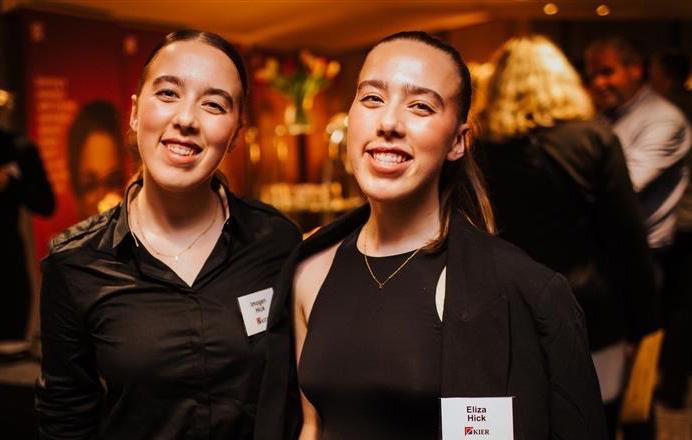
Exhibition showcases the skills of technicians, page 14
SOCIETY
Understanding trauma to help the homeless, page 22

HEALTH
JUSTICE AND SECURITY
SPORT

Vision for CHASE continued
Continued from page 1
Vice-Chancellor and Chief Executive, Professor Andy Long, said: “Northumbria has had a long-standing ambition to bring teaching and research activities from our Coach Lane Campus to our City Campus.
“Bringing our students and staff together into one central base in Newcastle means we can work far more effectively and as a true Northumbria community. This substantial award from the
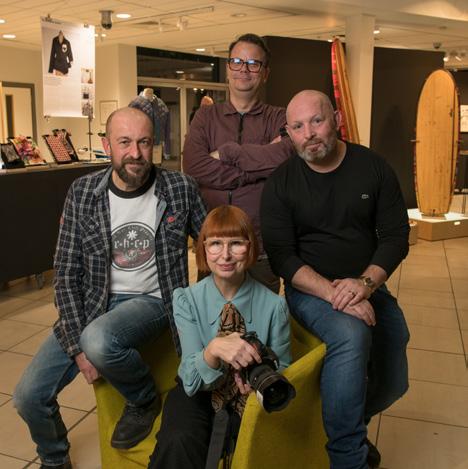

Office for Students marks the first step of this transformation of our estate.
“As a society we are facing significant health, social and economic inequalities and this new centre will provide a focal point for Northumbria’s excellence in research and education to meet the health and social care needs of stakeholders and communities in the city, the region and beyond. This is a truly exciting point for the
University which will bring significant benefits for our staff, students, partners and the wider city.”
Professor George Marston, Pro Vice-Chancellor for Strategic Projects, said that the Centre will be a major addition to the city’s health and social care infrastructure. “While it is early days in this project, plans are now being discussed at pace with colleagues, architects, partners and the City Council.
“This includes conversations with stakeholders around the future use of our land at Coach Lane,” he said. “We will, of course, share details as they are agreed.”
The flagship development is expected to open by 2027 and will mark a further stepchange for Northumbria’s reputation as one of the UK’s leading universities for research and teaching, following its success in the recent Research
Excellence Framework 2021 and being named Times Higher Education’s University of the Year 2022.
Find out more about CHASE in the Big Interview on page 11. Click the QR code to find out more about CHASE.

2 NEWS Northumbria University NEWS • Spring 2023
up to date with the latest news from Northumbria University at www.northumbria.ac.uk/news
Keep
Supporting transplant patients through life-saving surgery, page 23
Tackling the global plastic crisis through sustainable alternatives, page 17
NEWS
Sporting star goes to the Women’s Rugby League World Cup, page 32
Recognising unsung heroes of the peace process, page 29
A UNIVERSITY TRANSFORMED
MISS:
Hundreds inspired by Being Human events, page 12
BEING HUMAN
DON’T
High praise from frontbench MP
The importance of quality education and investment in research were two of the topics discussed by Shadow Minister for Higher Education, Matt Western MP, during a recent visit to Northumbria University.
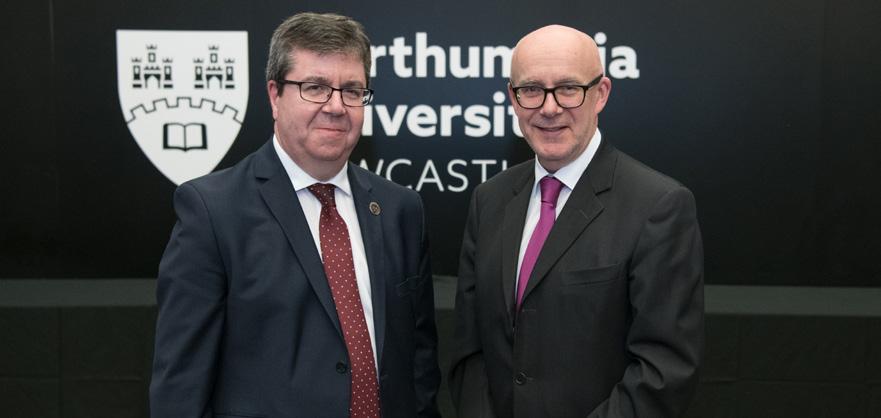
The MP for Warwick and Leamington met with Northumbria’s Vice-Chancellor and Chief Executive, Professor Andy Long, at the Newcastle City Campus and took part in a tour of a special research showcase alongside the Chief Executive of UK Research and Innovation, Professor Dame Ottoline Leyser.
Academics specialising in research looking at ice on earth and solar and space physics were among those who presented an overview of their work before Mr Western was introduced to students as well as members of the University’s senior leadership team.
The visit followed a seminar and question and answer session at Northumbria in January, led by former Education Secretary and Social Mobility campaigner Justine Greening, and reflects growing recognition of the University as a research-intensive institution with social mobility at its heart.
Professor Long said: “We are extremely proud that Northumbria has a growing reputation as a research-intensive modern university with a clear social mobility mission. Our journey to this point is being recognised in many ways, including our outstanding achievement in the Research Excellence Framework (REF) 2021 and being named University of the Year 2022 in the Times Higher Education (THE) awards.”
Click the QR code to watch a video of Matt Western sharing his thoughts on the work happening at Northumbria.



The Power of Five
North East universities are contributing £2.2 billion into the region’s economy, according to a new report from the region’s five institutions.

The report – Innovating Together: Universities in the North East (InTUNE) – highlights the collective contribution to innovation and business growth in the region by Northumbria, Newcastle, Durham, Sunderland and Teesside universities. It outlines the regional impact of the five universities supporting a combined 34,000 jobs, more than 700 graduate start-ups and 59 spin out companies in the period covered by the report. The companies have a combined turnover of nearly £300 million and workforces totalling just over 4,000 people.
Over the past seven years, 465 projects involving two or more of the five universities have been delivered with a research value of £243 million. The report focuses on nine joint innovation projects which target some of the region’s priority sectors while stimulating innovation, supporting business growth, and
King of design
The official logo for King Charles III’s Coronation has been created by Sir Jony Ive, an alumnus of Northumbria University.

Known for his innovative and iconic designs for Apple, including the iPhone, Sir Jony graduated from the BA (Hons) Design for Industry programme at Northumbria in 1985.
His latest design for the Coronation logo, developed with his creative collective called LoveFrom, draws inspiration from
improving productivity. Among the nine projects is the Northern Accelerator programme, established to boost the commercialisation of academic research. The programme has increased the average number of spin-outs created each year more than four-fold.
The InTUNE report was launched at the Transforming Together Roundtable event in February hosted by Chief Executive of UK Research and Innovation, Professor Dame Ottoline Leyser, with the aim of exploring potential for further collaboration to benefit the region and local people.
“This report demonstrates very clearly how collaboration between diverse regional partners can fuel innovation with real impact,” she said. “UKRI is committed to working with our partners in the North East to shape a dynamic, diverse and inclusive research and innovation system that creates high quality jobs and public
traditional emblems from across the United Kingdom – a rose, thistle, daffodil and shamrock – and will be used during celebratory events during the long weekend in May.
The floral design is said to reflect the King’s love of nature and forms the shape of the St Edward’s crown which will be used in the Coronation.
Sir Jony, who also designed this year’s Red Nose in support of Comic Relief, said of the Coronation emblem: “It is such an honour to be able to contribute to this remarkable national
services, benefiting the whole region.”
Dan Monnery, Chief Strategy Officer at Northumbria University, added:
“We are proud to partner with our fellow North East universities, working together as anchor institutions to help drive forward the levelling up agenda and the grow the region’s economy.
“As a research-intensive university we embed quality research at the centre of everything we do, enabling us the meet the world’s changing needs and make a positive difference. This is significant for the region, not only for local students who wish to benefit from a research-informed education, but also for regional businesses who can access impactful research and innovative partnership opportunities.”
Click the QR code to read more on the InTUNE report.
occasion and our team is so very proud of this work. The emblem speaks to the happy optimism of spring and celebrates the beginning of this new Carolean era for the United Kingdom. The gentle modesty of these natural forms combine to define an emblem that acknowledges both the joyful and profound importance of this occasion.”
3 NEWS #TakeOnTomorrow
Click the QR code to read more information about the emblem design.
NEWCASTLE QUAYSIDE: A NEW REPORT HIGHLIGHTS THE REGIONAL IMPACT MADE BY THE UNIVERSITIES ACROSS THE NORTH EAST.
PROFESSOR ANDY LONG AND MATT WESTERN MP
Building futures with book donation
A partnership between Northumbria University and the world’s second-largest publisher has secured a book donation worth £2,000 for a local learning centre that supports students from under-represented groups to progress to higher education.
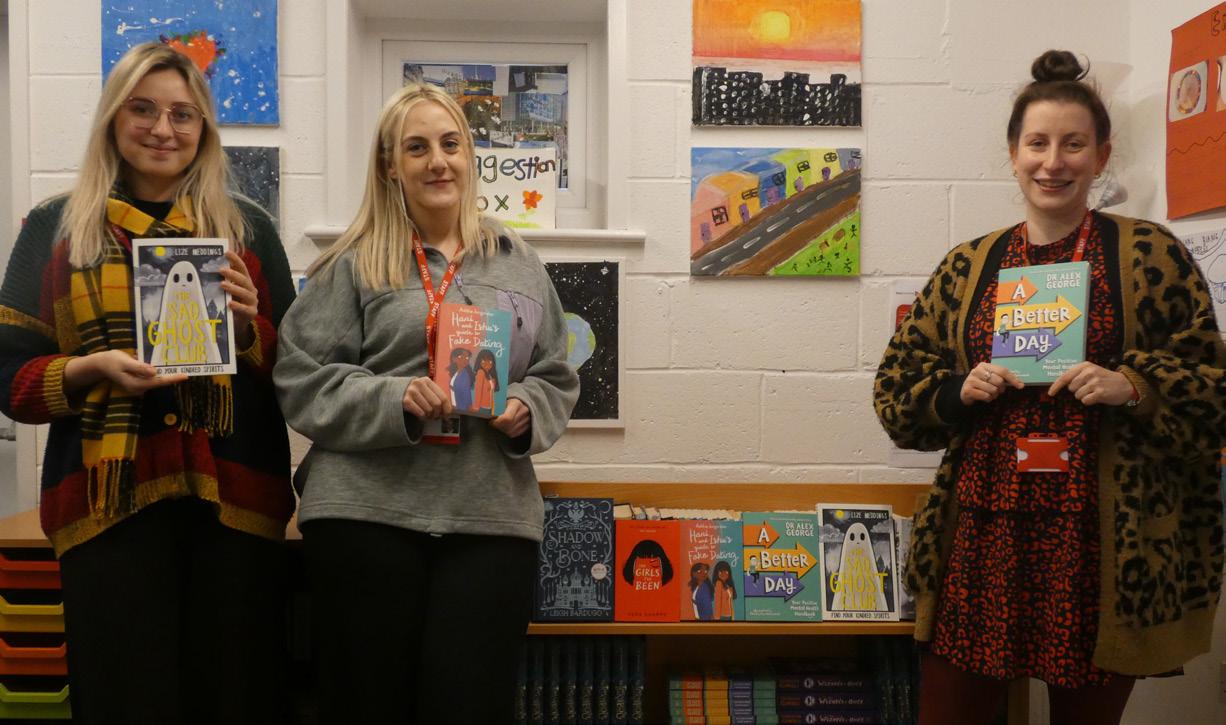

Global publisher Hachette has gifted 160 brand-new books to the IntoUniversity centre in Newcastle’s East End. The centre is a partnership between Northumbria and Newcastle universities and IntoUniversity - the UK’s largest universityaccess charity – and helps disadvantaged young people achieve a place at university. The books have been donated in memory of the Centre’s first manager, Laura Duncalfe, who tragically died in a cycling accident in January 2022. The sizeable book donation is a fitting tribute to Laura, who was known for her love of reading.
“We’re delighted with the wonderful donation from Hachette,” said Newcastle’s IntoUniversity Centre Leader, Liam Raine. “When our young people first saw the new books, you could see all our voracious readers chomping at the bit to get started with them. If Laura loved anything, it was reading. I know she would be happy to see a new generation of readers here in Newcastle East.”
Northumbria University’s Higher Education Without Barriers initiative supports the IntoUniversity centre and helps to ensure that everyone with the potential to go to university, should have the opportunity to do so. The University is providing a range of financial initiatives, mental health and wellbeing services and community-based projects to make participation and progression in higher education more achievable for academically talented students irrespective of their social or economic circumstances.
Dan Monnery, Chief Strategy Officer at Northumbria University, said: “Many young people from the city will reap the benefits from this generous donation to the library established in Laura’s memory. IntoUniversity demonstrates our commitment to enabling young people to engage with higher education. It opens doors to underrepresented groups and helps deliver lifechanging outcomes. It is an
incredible example of the joint civic contribution of the two universities in Newcastle.”
Northumbria University already has an established partnership with Hachette, with the two organisations collaborating on a unique one-year Master of Arts (MA) Publishing degree. The course is designed to address skills gaps within the publishing industry, including content marketing, building brands via new channels like vlogging and podcasting, and an understanding of numerous digital publishing platforms. It is the first university course in the UK to offer students a guaranteed placement with a global publisher and the opportunity to work with a writing development organisation, New Writing North on various live projects. Richard Kitson, CEO at Hachette said: “Our mission at Hachette UK is to make it easy for everyone to discover new worlds of ideas, learning, entertainment and opportunity
“INTOUNIVERSITY DEMONSTRATES OUR COMMITMENT TO ENABLING YOUNG PEOPLE TO ENGAGE WITH HIGHER EDUCATION. IT OPENS DOORS TO UNDERREPRESENTED GROUPS AND HELPS DELIVER LIFE-CHANGING OUTCOMES.”
and we are delighted that this donation to the IntoUniversity centre will help support and develop young readers from disadvantaged backgrounds further their chances of higher education as well as honour the memory of Laura Duncalfe”. IntoUniversity centres are based in the heart of local communities across the UK and support young people from age seven to 18, working closely
with schools and families. The centre in Newcastle, which is funded by Northumbria and Newcastle universities, is the first of its kind in the city and benefits over 1,000 local students a year.
Click the QR code to read more information about the book donation.

4 Northumbria University NEWS • Spring 2023 NEWS
DAN MONNERY, CHIEF STRATEGY OFFICER AT NORTHUMBRIA
INTOUNIVERSITY NEWCASTLE CENTRE STAFF: COURTNEY HAYES, LAURA ALLISON AND ALICE HOLDEN.
Out of this world experience for budding space scientists
Pupils from a North East secondary school were given an insight into the fascinating world of space science during a recent visit to Northumbria University.
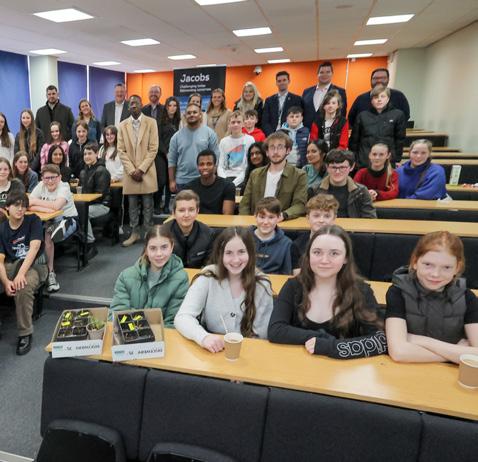
The group of 13-17 yearolds, from Carmel College in Darlington, were all taking part in The Big Project – an annual initiative run by global technical consultancy Jacobs.
Each year students from across the region are set a challenge, working in teams to come up with original ideas which they pitch to a panel of judges in a ‘Dragon’s Den’ style three round competition.
With this year’s challenge based around how space can improve our life on Earth, Jacobs turned to Northumbria’s internationally renowned Solar and Space Physics research team to support the students with their work.
Students were given a tour of Northumbria’s brand-new Space Technology Laboratory, where they were involved in a number of experiments, including measuring the distance between objects with a laser interferometer, and using a vibration system to explore the importance of frequency and resonance when launching satellites.
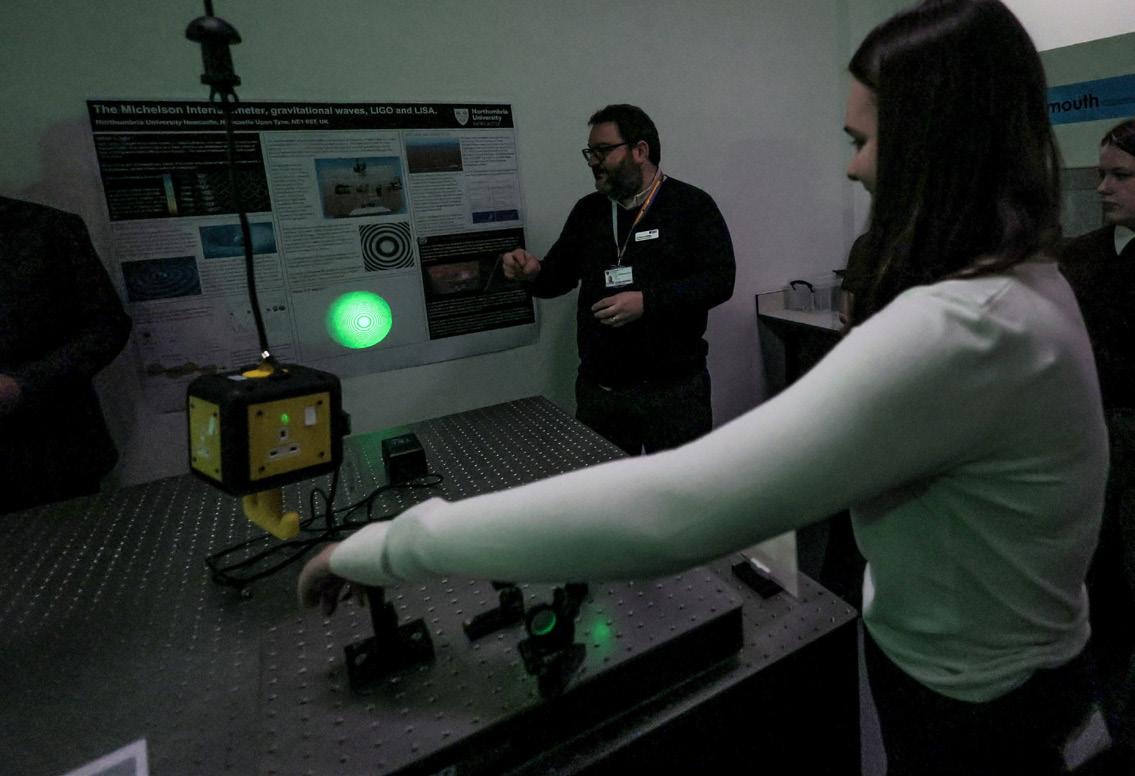
They pitched their Big Project challenges to the panel of judges, with ideas which included the use of satellites to generate solar energy, and parcel delivery via space using eco-pods to reduce congestion and pollution on Earth.
Mike Bowen, Senior Associate Director at Jacobs, said:
“Working with Northumbria has given us a fantastic opportunity to bring pupils from
the schools we engage with to the University to give them an experience of what academia is like and help support them in making their future career choices.”
Louise Bracken, Pro ViceChancellor for Research and Knowledge Exchange at Northumbria, added: “‘We are excited to be part of the Big Project with Jacobs and are thrilled to be able to give students the opportunity to visit Northumbria University to explore our facilities and experience our education and research.
“We really value our exciting relationship with Jacobs which we believe will bring real benefits to our region. We hope being involved in the Big Project will inspire these students to apply to university, develop their interests and become the skilled workforce of the future.”
Newcastle upon Tyne Central MP Chi Onwurah spent time meeting the pupils during their visit. She commented:
“What is important about events like today is that it makes science real for young people and makes them realise that there is something they can contribute to the exciting sectors and industries linked to space.”
Click the QR code to watch a film made during the visit.
Is AI the answer to space weather threat?
A Northumbria University physicist has been awarded more than half a million pounds to develop artificial intelligence which could protect the Earth from devastating space storms.
It may happen over 90 million miles away, but activity from the Sun can result in serious disruption to power and communication systems here on Earth. With our increasing reliance on technology, solar storms can seriously interrupt our everyday lives, which is why severe space weather was added to the UK National Risk Assessment for the first time in 2011.
Northumbria’s Dr Andy Smith has recently been awarded a Research Fellowship from the Natural Environment Research Council (NERC) to explore how physics-inspired machine learning could be used to forecast space weather more accurately and predict serious space storms. Dr Smith and his team will analyse huge amounts of data from satellites and space
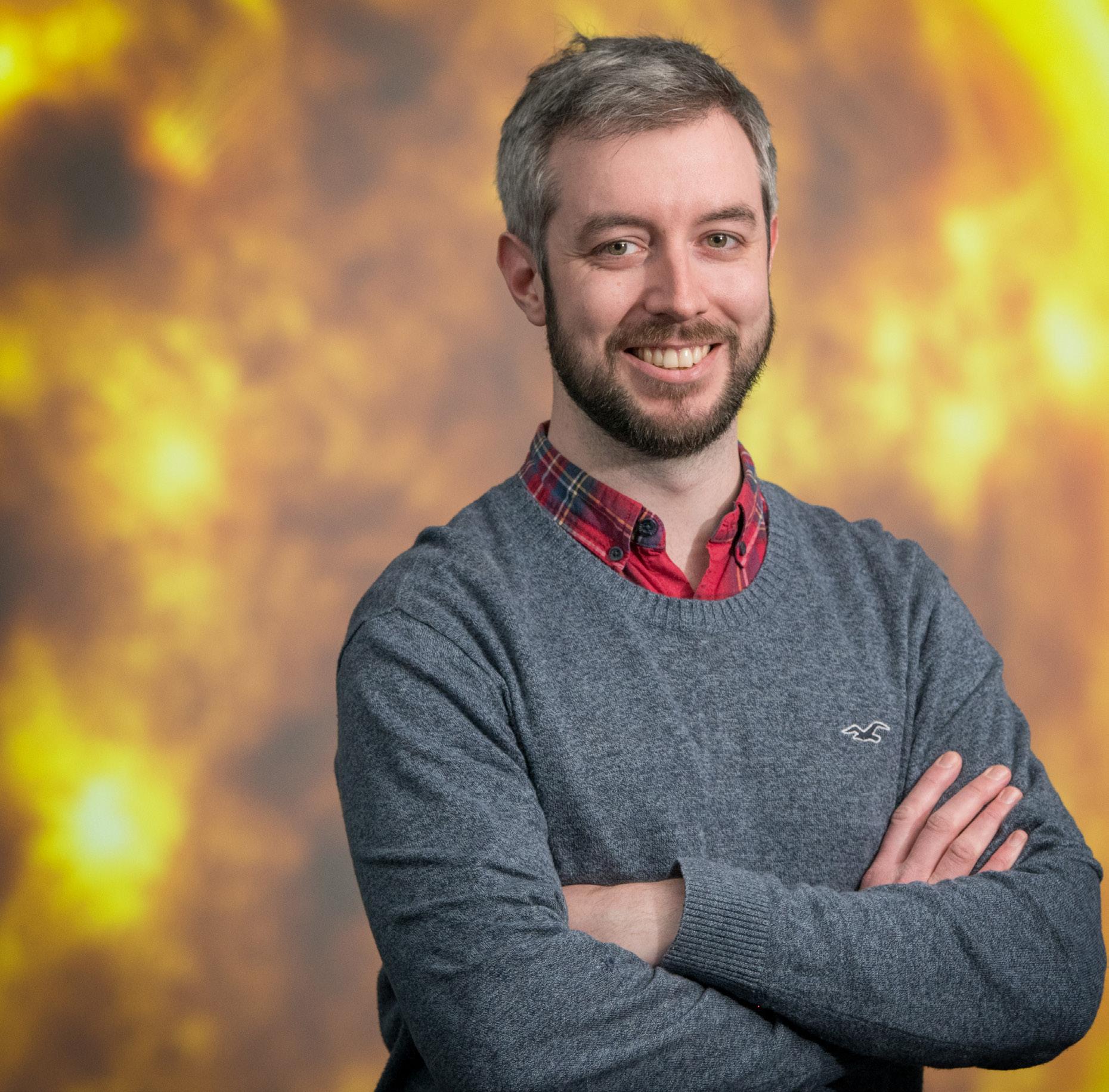
missions over the last 20 years to gain a better understanding of the conditions under which storms are likely to occur.
They will then develop cuttingedge computer models which will use the data to predict when such storms could occur in future, forecasting phenomena such as the aurora borealis, or northern lights.
As Dr Smith explains: “One of the primary ways in which space weather can impact society is through an unexpected surge of energy in power networks and pipelines on the ground. These surges can accelerate the ageing of power systems, or even lead to the immediate failure of components such as power transformers, leading to a complete loss of power.
“The technology we are developing through this project
could protect the Earth from the impact of geomagnetic storms as we could predict when such events would occur, allowing us to prepare. For example, in the UK this would be coordinated through the Met Office which would inform the National Grid, which would in turn activate plans to protect our power grid.
“It’s not a case of if the Earth will be hit by a serious space weather event, it’s a case of when – and this physics-inspired artificial intelligence system will allow us to predict such an event and protect ourselves from it.”
Click the QR code to find out more about solar and space physics research at Northumbria.


5 #TakeOnTomorrow NEWS
THE PUPILS FROM CARMEL COLLEGE DURING THEIR VISIT TO NORTHUMBRIA.
“IT’S NOT A CASE OF IF THE EARTH WILL BE HIT BY A SERIOUS SPACE WEATHER EVENT, IT’S A CASE OF WHEN – AND THIS PHYSICS-INSPIRED ARTIFICIAL INTELLIGENCE SYSTEM WILL ALLOW US TO PREDICT SUCH AN EVENT AND PROTECT OURSELVES FROM IT.”
DR ANDY SMITH
Northumbria at centre of Anglo-American political research
An advisor to former US President Barak Obama was among the speakers at a Northumbria University event exploring the current shared challenges faced within the UK and US political systems.
Honouring inspirational figures
The public event, hosted at the University’s City Campus in collaboration with the US Embassy, welcomed special guest Stephanie L. Young to join discussions about democracy, media and accountability in politics and the future electoral challenges facing both countries.
Stephanie was Associate Communications Director and Senior Public Engagement Advisor for the Obama Administration and is currently Director of the ‘When We All Vote’ initiative launched in 2018 to increase US voter registration. With significant media and federal government experience, the former Presidential adviser led on the communications strategy for the non-partisan engagement campaign which helped register more than 500,000 new voters in the 2020 US mid-term elections – the largest increase in voter participation in over 120 years.
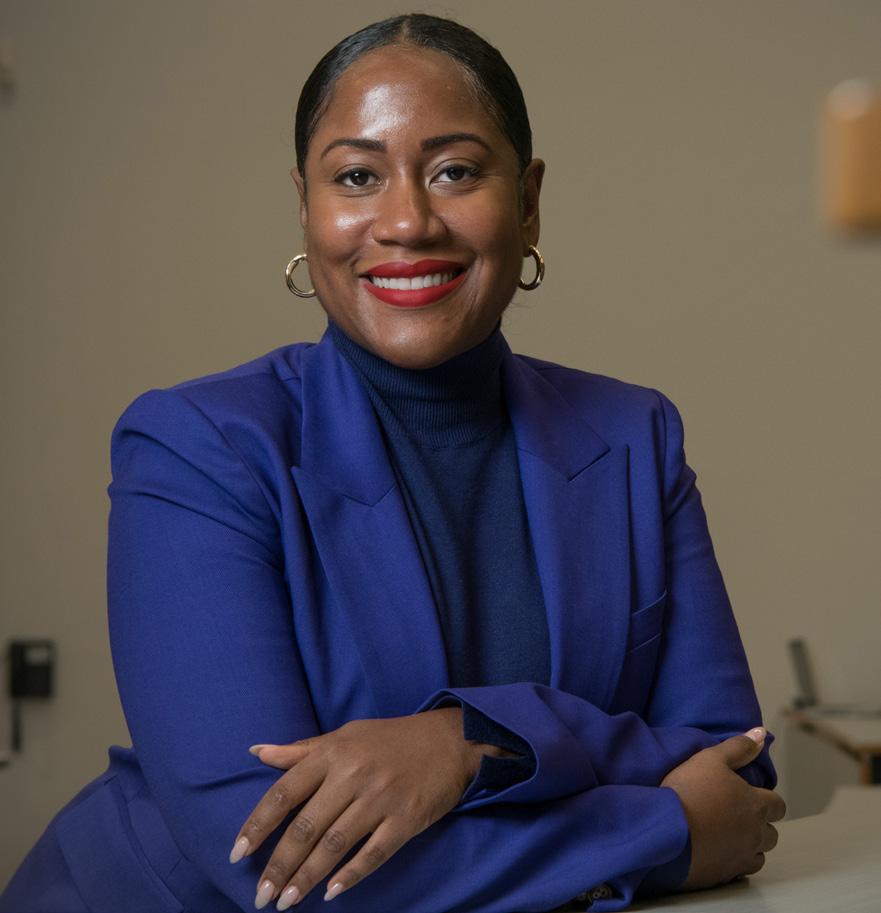
The event included a roundtable discussion chaired by the University’s Professor in American Studies, Brian Ward, who said: “Over the past decade Northumbria has become one of the UK’s foremost centres for research and teaching in US history, politics, literature, and popular culture.”
Stephanie added: “The state of democracy in the US, the UK, and across the globe is being tested like never before, and I was honoured to partake in this important discussion at Northumbria University.”
To read more about this story, click the QR code.
Northumbria University awarded honorary degrees of Doctor of Science to three inspirational individuals during its 2022 winter congregations.
Honorary degrees are awarded to people who have attained the very highest standards of scholarship or demonstrated outstanding achievement or distinction worthy of national and international recognition in their academic or professional field.
Among those receiving the honorary degree of Doctor of Science was award-winning engineer, author and broadcaster, Roma Agrawal. Roma is best known as the structural engineer behind London’s landmark 95-story high skyscraper the Shard -currently the tallest building in Western Europe.
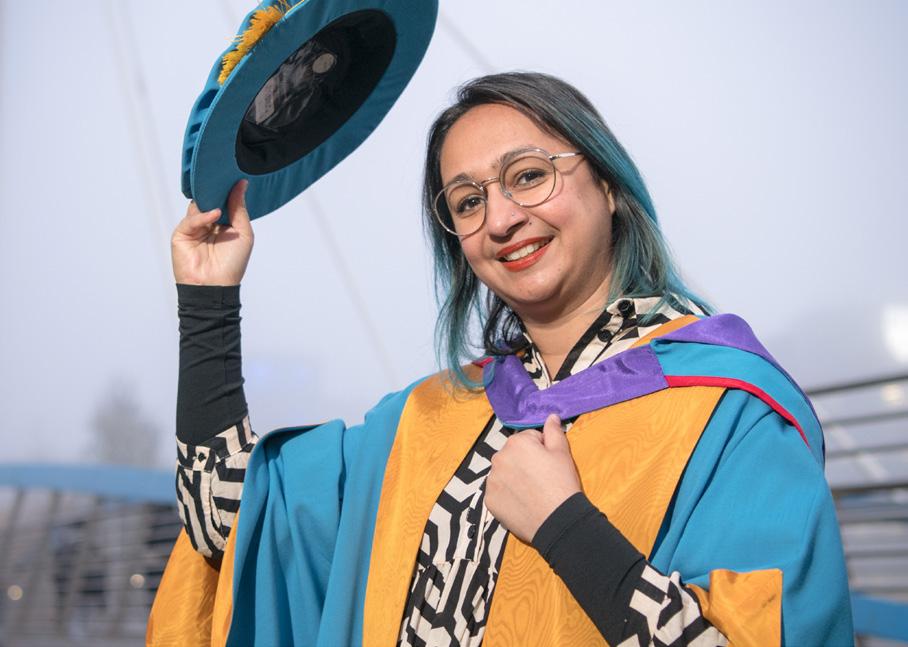
However, her very first job after graduating from university was to design and build the distinctive footbridge that crosses Newcastle Central Motorway. The bridge installed in 2007, links Northumbria University’s east and west city campuses and provides a safe
pedestrian and cycle route into the centre of Newcastle.
Joining Roma in receiving an honorary degree from Northumbria University was owner and managing director of Newcastle Eagles Basketball Club, Paul Blake. A Northumbria alumnus, Paul graduated with a degree in Sports Management in 1994. Just five years later, at the age of 28, he bought the Newcastle Eagles Basketball Club from former Newcastle United Chairman Sir John Hall.
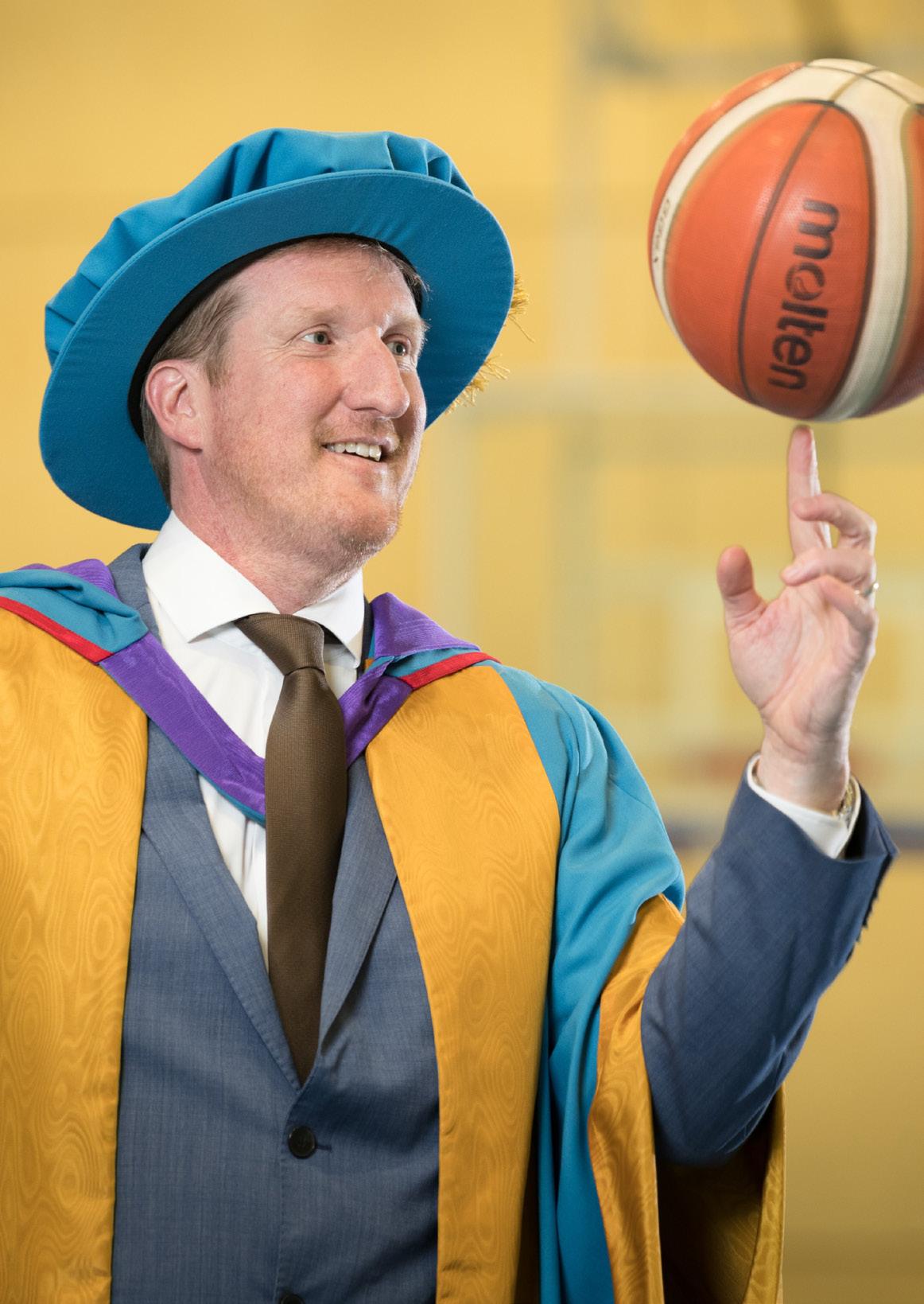
Since then, under his management and guidance, the Newcastle Eagles have become the most successful team in British basketball history, winning 27 trophies over the last 20 years.
Fellow Northumbria alumnus
Tom Harrison was also awarded an honorary degree. As Chair of the International Centre for Connected Construction, Tom is highly

respected across construction and management consultancy, both in the region and internationally.
Tom graduated with a degree in Surveying from Northumbria in 1977. He went on to work at Turner & Townsend, Global Construction Consultants for over 40 years, latterly as Chief Operating Officer.
Tom was one of the driving forces behind Turner & Townsend’s growth into a global business, which now operates in 110 offices across 45 countries. An active member of Northumbria’s alumni community, Tom has delivered guest lectures at Northumbria on project management, leadership and business acumen.
To find out more about honorary degrees awarded by Northumbria, click the QR code.


6 NEWS Northumbria University NEWS • Spring 2023
STEPHANIE L. YOUNG
PAUL BLAKE ROMA AGRAWAL
TOM HARRISON
Technician inspired by grandson to help children in hospital
A talented Technician from Northumbria’s School of Design has received support from a luxury fashionwear retailer, with headquarters in the North East, in her mission to adapt clothing for children receiving vital treatment.
The work of Denise Crawford, a sewing machinist by trade who has worked at Northumbria for 16 years and supports students and staff in the University’s Fashion department, caught the attention of fifth generation family-owned business, Barbour.
She was inspired to start modifying t-shirts for children in Newcastle’s Royal Victoria Infirmary (RVI) when her grandson, Finnley, was undergoing chemotherapy treatment at the hospital for a brain tumour in 2020.

Denise explained: “When children are having chemotherapy, as part of the treatment, they often have a portacath or Hickman lines implanted in their chest to be accessed when having blood taken or to receive intravenous chemotherapy treatment. This usually requires the child to remove their top or take an arm out of a sleeve, which isn’t always the best way for staff to have clear access. The anxiety or worry in removing clothing
can also make an already difficult time worse for children, particularly older girls.
“Whilst on the ward one day, my daughter-in-law and grandson were speaking to the play specialist, Lisa, who helps children to feel as comfortable as possible while receiving their treatment. She showed them some t-shirts she’d received from a charity in America with zips to make access easier and more comfortable for the children, but finding the right size for each child was taking a long time.”
Denise decided to put zips into some of Finnley’s t-shirts and bought others in various styles and sizes to install zips, before donating them to Ward 14 in the paediatric oncology day unit for other children. It was then Denise received a donation from Barbour. The company donated 100 t-shirts which have been customised by Denise and her colleagues for children at the RVI.
Lisa Ternent, Nursery Nurse on Ward 14, said: “Our patients are often anxious about having their
Graduates showcase the future of fashion
ports accessed and removing a t-shirt can be difficult as this is often their security blanket. The zip t-shirts make the procedure a lot easier and more positive.
When Denise started adapting the t-shirts, it was a massive help to the ward and patients. She is fabulous and we can’t thank her enough.”
To find out more about Northumbria School of Design, click the QR code.


Four talented fashion graduates from Northumbria University were selected to have their work spotlighted by Fenwick in the iconic windows of the Newcastle department store.
The flagship department store brand, which has stores across the country, launched an autumn campaign to celebrate established and rising stars within the fashion industry, while also exploring what the future of fashion might look like.
Fenwick Future Makers formed part of the campaign, based around a partnership with the organisers of Graduate Fashion Week, the Graduate Fashion Foundation.
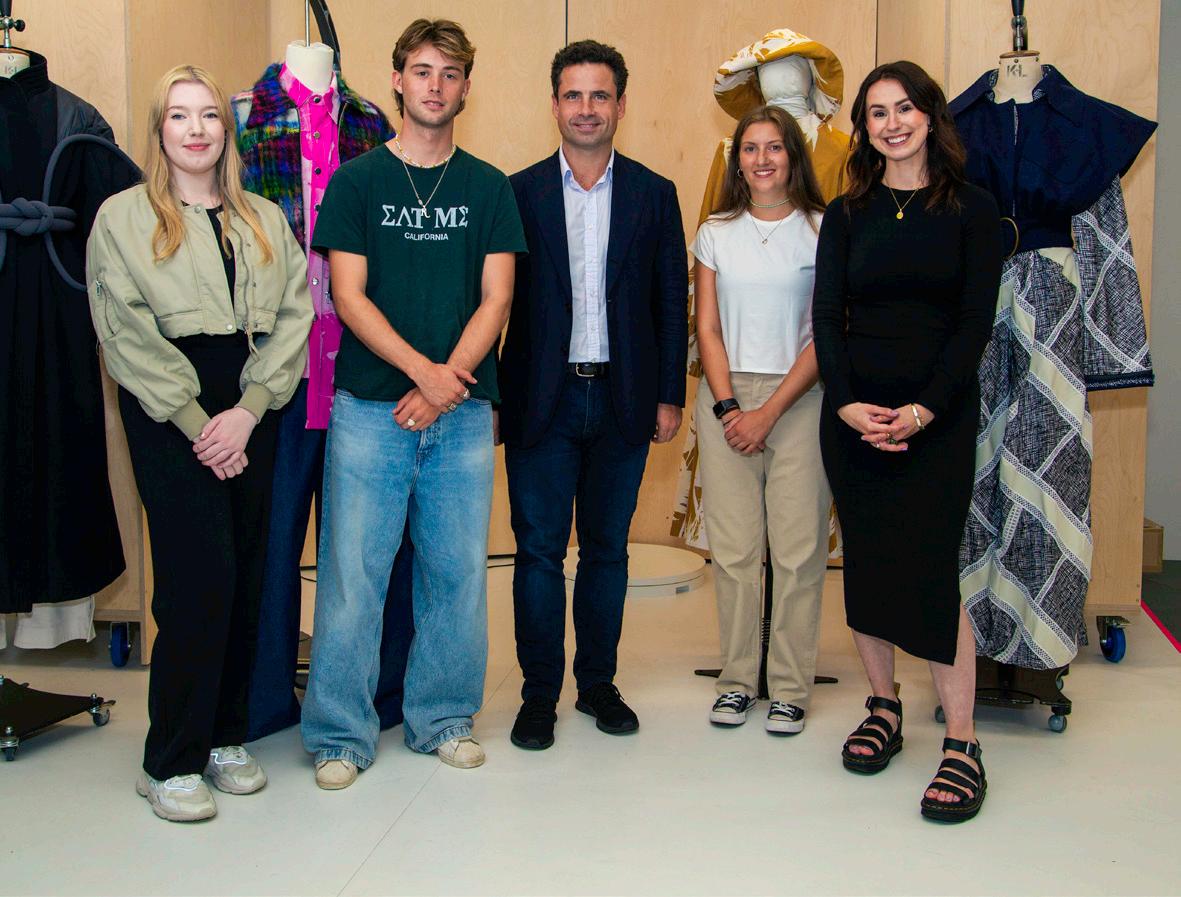
The collaboration provided a platform for graduates from Northumbria University and Kingston University to use the
windows of Fenwick stores in Newcastle and London to showcase clothing they had designed and made. In Newcastle, the designs of Northumbria graduates could be seen throughout October.
Graduates of Northumbria’s Fashion BA (Hons) course, Melissa Newton, Holly Hooker, Will Howard-Jones and Emily Gibson, were all selected to feature. Each of their womenswear and menswear designs stood out from the crowd and received significant recognition from industry experts, during Graduate Fashion Week 2022, held in London.
Leo Fenwick, Head of Brand and Community at Fenwick, said: “We are proud to partner with Graduate Fashion Week and Northumbria University, as part of our Fenwick Future Makers project. This enables us to foster and nurture relationships with the graduates, who will soon be paving bright fashion careers within the industry.”
7 NEWS #TakeOnTomorrow
NORTHUMBRIA FASHION GRADUATES: EMILY GIBSON, WILL HOWARD-JONES, HOLLY HOOKER AND MELISSA NEWTON WITH LEO FENWICK (CENTRE).
LISA TERNENT (LEFT) AND DENISE CRAWFORD (RIGHT) WITH PATIENT SIENNA STEELE, AGED 10.
to watch
Click the QR code
a video about the campaign.
Heartfelt thanks for success of ‘Leave Newcastle Happy’ campaign

Students in Newcastle have raised thousands of pounds for charity and diverted tonnes of waste from landfill by donating their unwanted items as part of a city-wide campaign.
Leave Newcastle Happy is a clean-up initiative led by Northumbria Students’ Union, in collaboration with Northumbria University, which provides opportunities for students moving out of their accommodation to dispose of their unwanted goods either by donating, recycling, or sending to refuse.
Rubbish skips for household waste were provided in local areas at the end of the academic year and students were encouraged to take unwanted items to the British Heart Foundation (BHF) donation banks near Universityowned student accommodation, as well as donation banks at the Newcastle City and Coach Lane campuses. These donations have been part of the University’s involvement with BHF’s ‘Pack for Good’ campaign since its launch in 2012. By selling them, the charity is able to raise funds for research and treatment of heart and circulatory diseases.
In the 2021-2022 academic year, Northumbria students donated well over 2,000 bags of items; the largest donation of
A mission for social mobility
all Newcastle organisations that took part and the University’s best year yet. This equates to 17.6 tonnes being diverted from landfill—the equivalent of 103,642kg CO2 emissions—and nearly £31,000 was raised for the charity.
Along with Newcastle University, Newcastle City Council and private student accommodation providers, donations from around the city diverted 203 tonnes from landfill and raised a total of almost £355,000.

David Jewell, Head of Student Experience and Wellbeing at Northumbria Students’ Union, said: “We would like to thank our students for their generous support and encourage them to look out for this year’s campaign launching soon.”
Click the QR code to find out more about the work of the British Heart Foundation in the North East.


Northumbria University is committed to social mobility and offering opportunities to students with potential and ability — irrespective of background.
In 2022, the University launched its Higher Education Without Barriers campaign, to enable talented students from all backgrounds to access higher education. Supported by businesses, charitable trusts and Northumbria alumni, the campaign has to date raised more than £2 million and benefited more than 800 students through a range of scholarships, hardship funding, enterprise and bursaries to help with the cost of accommodation and travel.
Victoria Nichol, Head of Advancement at Northumbria, said: “The opportunity to go to university can be life-changing but, for many, it is out of reach. Through our campaign, we are building a community of donors, who have so far provided £750,000 in scholarships. Scholarships are a significant investment in a students’ future and bring benefits that last a lifetime. They can also help businesses promote their values and brand among the brightest talents of tomorrow. Most importantly, however, scholarships can make a real difference and we are keen to welcome new businesses to our

network of donors.”
Supporters of the Higher Education Without Barriers campaign so far include Santander, CBRE, Version 1, The Institute of Leadership and Management, Enterprise Renta-Car, and The Unite Foundation. Another recent supporter is global catering and facilities management company Sodexo, who became the first to support Northumbria’s Sport Scholarship Programme. Focusing on women initially, the programme offers talented young sports coaches the chance to study at Northumbria.
Simon Knight, Managing Director for Sodexo Universities in the UK, said the organisation was extremely proud to support the programme, explaining: “This scholarship will enable students from underrepresented groups to achieve their ambitions as coaches and referees and encourage more people to pursue healthy, active lifestyles. We want to see all students thrive whilst at university and in the next chapter of their lives.”
Higher Education Without Barriers provides a range of support, including financial initiatives, to make participation and progression in higher education more achievable for academically talented students, regardless of their social or economic circumstances.
To find out more about opportunities to support Northumbria students through scholarships, click the QR code to read our impact report 2021/22.
8 NEWS Northumbria University NEWS • Spring 2023
Awards are in fashion at Northumbria
Staff and graduates from two Northumbria University fashion programmes are celebrating after securing a trio of awards resulting from a vital partnership with industry experts.
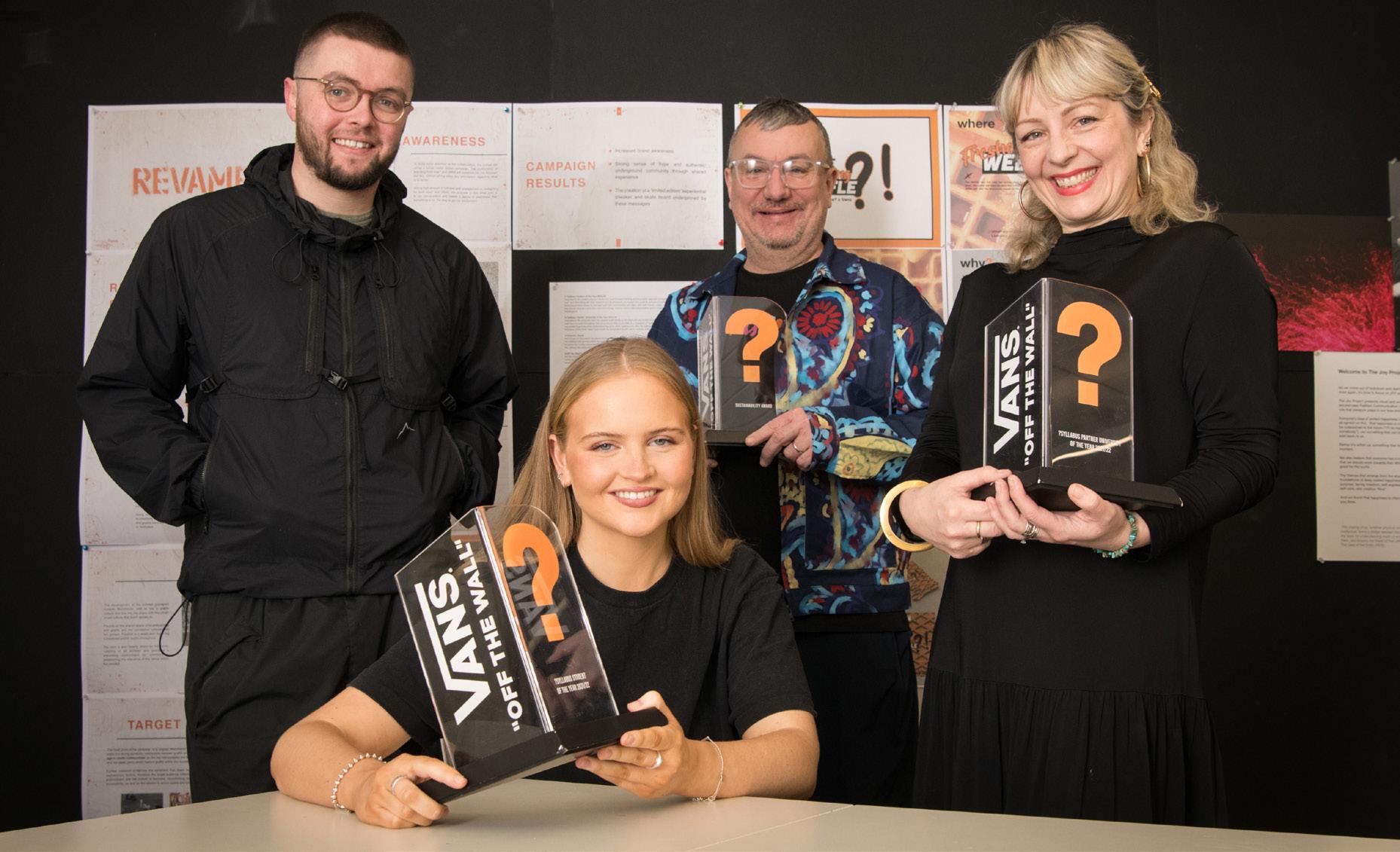
Final year students studying Fashion Communication and Fashion Design and Marketing at Northumbria’s School of Design were set the task of developing a marketing campaign or product design project based on a collaboration between streetwear brand size? and international footwear label Vans. Students were asked by size? to consider key brand pillars including community, music and sport, as well as looking at how they might launch their concept to market, while incorporating the action sports and street culture aspects that Vans is known for. At a special ceremony held in London in February, Northumbria picked up the three accolades as part of an awards scheme by size?, aimed at recognising the work which went into developing the campaigns and designs, and the efforts of universities across the country involved in teaching the size?syllabus programme. The ?syllabus is a learning framework that offers live briefs, industrylevel access and guidance from the team at size? – one of the world’s
leading streetwear retailers. Northumbria was presented with the Partner University of the Year Award, collected by Assistant Professors Gayle Cantrell and Christopher Hodge. Fashion Communication graduate Olivia Mackinnon was named Student of the Year. A project called ‘Revamp’ by fellow graduate, Imogen Hands, was recognised with the Sustainability prize.
As a direct result of the collaboration between Northumbria and size? at least two Northumbria graduates have already secured permanent roles with size?, while another has been employed by Vans.
Cameron Poole, who graduated from the Fashion Communication course in 2019 and has worked with size? ever since, explained: “We started the size?syllabus programme to give something back to a key community - the student population - as well as our main consumer base of 18 to 24-year-olds.
“From the off, Northumbria University took the size?syllabus and ran with it. As a result, the
quality of final submissions was incredibly high, a fitting tribute to the attention that both students and staff paid to the programme.”
Gayle, who is Programme Leader for the BA (Hons) Fashion Communication at Northumbria, said: “The advantages of projects like this are manifold. It gives
Graduate twins in step for career success
Twin sisters who graduated from Northumbria University last year have both kick-started their careers with the same high-profile company – and in the same department.

Keen dancers Imogen and Eliza Hick gained a Bachelor and a Master’s degree respectively from Northumbria’s Newcastle Business School in 2022. And now the 23-year-olds from Sheffield have secured high quality graduate roles in the Human Resources department of Kier Group - a leading UK infrastructure services, construction and property group. The Kier Group is one the UK’s top contractors for Government and private clients, working on high-prestige projects such as Britain’s new high-speed rail line HS2.
Both Imogen and Eliza see their appointments as dream career moves, but while they are now working together in HR, their journeys to success were quite different.
Having missed the grades she needed to enrol directly onto a business degree, Imogen opted for a Foundation course at Northumbria and has not looked back. She explained: “Missing my A Level results felt like the end of the world but looking back, the Foundation year was the ideal stepping-stone for me and meant I could then choose the course I really wanted in Human Resource Management. There’s also a massive emphasis at Northumbria on employability and improving your skill sets. The Graduate Futures and graduates career pages at the University were also excellent and paired me really well with an amazing placement year with GlaxoSmithKline – even during lockdown.
students confidence, because their contributions are being heard by real people in industry and they’re seeing those ideas realised, sometimes beyond the project.
“Not only that, but because this is real-world experience, it generates real passion, and a number of students go on to
start jobs in the field straight after graduation, often because they’ve impressed judges so much with their work.”
Click the QR code to read more about Northumbria’s work with size?.

It meant that overall, my experience at Northumbria was really positive.”
Imogen graduated in July last year with First Class Honours and started with Kier in September. “To now be working alongside my twin sister with a major company like Kier is incredibly exciting and rewarding,” she added.
Eliza did achieve the grades required to study psychology as a first degree at the University of Liverpool, and after graduating she decided to enrol for a Master’s in Business at Northumbria’s Newcastle Business School. She said the vibe at Northumbria and the city of Newcastle in general was excellent, adding: “The amount of contact I had with my personal tutors at the University was on a different level, and that face-to-face contact meant I enjoyed my Master’s year way more than I did my undergraduate degree. I could also see Imogen and other
people getting great results at Northumbria so I could tell the Business School was really good.
“Imogen and I are also keen dancers. It sounds ridiculous but we are both competitive and wanted to go somewhere that had a really good dance team – and Northumbria certainly had that, which made it a lot of fun.”
Eliza graduated with Distinction with an MSc in Business with Human Resource Management from Northumbria in December last year, and now works alongside Imogen at Kier. Summing up, the twins feel their story demonstrates that different paths can still lead to success and positive outcomes.
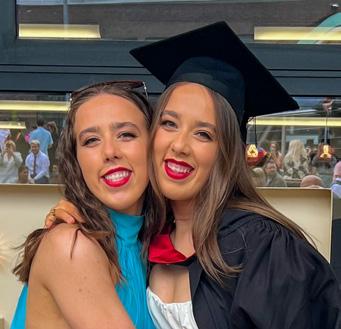
Click the QR code for more information on studying at Northumbria’s Newcastle Business School.

9 NEWS #TakeOnTomorrow
CAMERON POOLE FROM SIZE? WITH OLIVIA MACKINNON, CHRISTOPHER HODGE AND GAYLE CANTRELL ARE PICTURED WITH THE THREE AWARDS.
The Conversation is a collaboration between news editors and academics to provide informed news analysis and commentary that’s free to read and republish. At Northumbria, our academics have been working with The Conversation to produce independent, quality current affairs journalism on some of the latest topics to hit the news.
HERE ARE SOME OF OUR TOP PICKS OF RECENTLY PUBLISHED ARTICLES
CALLING ALL NORTHUMBRIA ACADEMICS!
If you have a great idea for an article, please email media.communications@northumbria.ac.uk






Jacinda Ardern resignation has people wondering when to quit –but that’s the wrong way to think about burnout

Following Jacinda Ardern’s decision to resign, discussions sparked around identifying the “right time” to leave a job and whether burnout can affect those decisions. Anthony Montgomery, Professor in Occupational and Organisational Psychology at Northumbria, highlights the ways to recognise and prevent burnout.

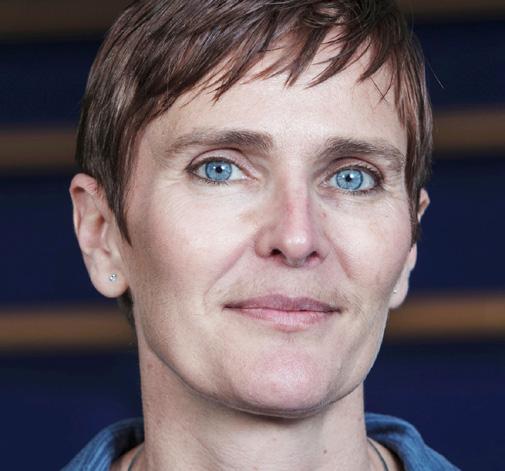
How wildlife in ponds has evolved to survive frozen water – and how you can help more animals stay alive

Towards the end of 2022, the UK experienced a spell of severe wintry weather with snow, ice and fog covering the country. Associate Professor in Ecology, Dr Mike Jeffries, discusses the methods insects and plants use to survive a cold snap.



Why food is such a powerful symbol in political protest
Activists are using food to draw attention to some of today’s most pressing issues. Ekaterina Gladkova, a Lecturer in Sociology and Criminology at Northumbria, discusses why food is such a powerful symbol of political protest.

Seoul Halloween crush: understanding the science of crowds could help prevent disasters – here’s how
Large crowds are inevitable at annual events such as Halloween, however, understanding the science of crowds could help to prevent disasters in the future. Northumbria Professor of Computer and Information Sciences, Martyn Amos, discusses our understanding of crowds after the Seoul Halloween crush.

Calling
politicians ‘clowns’ is a disservice to clowns – yes, really

In recent years, ‘clowns’ is a description that has been increasingly used to mock the incompetence of those in power. Dr Sean McCusker, Associate Professor in Social Work, Education and Community Wellbeing at the University, discusses the important role clowns have played in society throughout history and why you may think twice about comparing them with politicians.
Should I post photos of my children online? Here’s what new parents need to know about sharenting
Over 40% of UK parents post photos or videos of their children online. Claire Bessant, Associate Professor in Law at Northumbria, defines the recently coined word “sharenting” and the risks associated with sharing photos or videos of your children online for the world to see.

Find out more about The Conversation, and keep up to date with articles by Northumbria academics, by visiting www.theconversation.com or our online newsroom at www.northumbria.ac.uk/news

10 Northumbria University NEWS • Spring 2023
Research informs everything we do at Northumbria, so our leading researchers will be working with partners to better understand the main causes of health and social inequality, create solutions and drive governments to make policy changes for the benefit of all. Partners will benefit from access to the latest knowledge and insights from an interdisciplinary team of researchers based on one campus in the heart of Newcastle, making it easier for us to work collaboratively.
So, is this primarily a building project?
THE BIG INTERVIEW
PROFESSOR GEORGE MARSTON
Following the announcement of the development of the University’s new Centre for Health and Social Equity, known as CHASE, Northumbria University News speaks to Professor George Marston, Pro Vice-Chancellor for Strategic Projects, to find out more…

Quite simply, CHASE will be the biggest transformational project the University will undertake between now and 2030.
Regionally, nationally and globally we are facing many burning issues in relation to health and social equity: how can we reduce health inequalities; how can we really understand the social determinants of health inequalities; how can we drive social equity, ensuring fairness and equality for all, regardless of background?
These are not new issues. They have been part of our society for generations and they need to be addressed. CHASE will bring together Northumbria colleagues working across a wide range of
disciplines to share their expertise with one another and with external stakeholders, to deliver the strongest possible responses and solutions to these burning problems.
Key to this will be the movement of much of Northumbria’s teaching and research activity in healthcare, education and social work which is currently delivered at our Coach Lane Campus on the outskirts of the city, to the City Campus. This will enable us to develop spaces across our Newcastle City Campus, including constructing a new state-of-theart building as a base for those working in these areas.
We are delighted that the Office for Students has recognised the significance of this work in their award of almost £6 million to take CHASE forward.
What
We already know that we are a centre of excellence for our outstanding research in health and social inequality. This was evidenced in the results of the Research Excellence Framework, which analyses the quality of research undertaken in all UK universities and the real impact it has on our society. Through CHASE we can build on this reputation to bring together, and attract, the best researchers. It will transform experiences for our students, staff and partners and make Northumbria the go-to place for anyone working in, or wanting to work in, these areas.
Most of our students and staff based in Newcastle will come together on our City Campus and have access to the same services and facilities rather than being spread across two campuses a number of miles apart. They will be able to work and socialise with people from different disciplines and enjoy the experience of being based on a city centre campus. We do intend to retain a presence at Coach Lane for some of our more specialist professional development training provision and we are looking into how that will be shaped going forward. CHASE will also contribute to a significantly improved student experience for students already based at our City Campus. We’ll be able to create more research labs, develop new and improved teaching and support spaces, and we’ll be able to create new social and learning spaces for students and staff.
And importantly, as part of the development, we’ll also be creating a new energy centre to heat some of our buildings, which will have a positive impact on our Net Zero ambitions, significantly improving Northumbria’s sustainability credentials.
Where exactly will CHASE be based?
The answer to this is two-fold. CHASE already exists in a virtual form and is a growing focus for staff working on issues of health and social equity across the whole University. Professor Monique Lhussier, a leading expert in marginalisation, wellbeing and equity, was appointed Director of CHASE last autumn and a key element of her role is working with key stakeholders inside and outside the University to develop the overall vision for the Centre. However, we also need to create a physical home for it and for the staff and students who will move from Coach Lane onto our citybased campus. Plans are under development with proposals for a new building in the centre of our campus.
No, not at all. While our initial focus is on the creation of a world-class facility to support this important initiative, CHASE is much more than a building. It is a collaboration of staff from across the whole of Northumbria University, many of whom are already working with the NHS, the Integrated Care System, local authorities, charities, the voluntary sector, businesses, and the community.
The range of disciplines that will contribute to the creation of CHASE is huge and varied reaching beyond what you might typically expect to find. Northumbria architects and computer scientists are creating buildings specially designed for the ageing population.
Our product designers and engineers are working with medics, creating new devices and equipment to help people manage complex health conditions. Our experts in social policy and law are challenging structural inequalities and much, much, more.
While the new building will be a front door and a physical home, CHASE will ultimately bring together researchers from all areas to bring improvements to the lives of individuals.
When do you expect the new CHASE building to open?
Our goal is to open the physical home for CHASE in the 2026/27 academic year. But before this, engagement across the whole University and with partners across and outside of the region is incredibly important. These conversations are now happening and will shape and inform our plans and the design for the new building and the way we work, ensuring we create exactly what is needed for 2027 and beyond.
After being named Times Higher Education’s University of the Year for 2022, CHASE is yet another example of the truly innovative and exciting things happening here at Northumbria University – where quality research, an outstanding student experience and a clear social mobility mission are embedded at the centre of everything we do.
Click the QR code to discover more about the CHASE project.

11 #TakeOnTomorrow
FEATURE
Tell us about CHASE
will CHASE mean for Northumbria students, staff, and partners?
“QUITE SIMPLY, CHASE WILL BE THE BIGGEST TRANSFORMATIONAL PROJECT THE UNIVERSITY WILL UNDERTAKE BETWEEN NOW AND 2030.” PROFESSOR GEORGE MARSTON
Thousands tuned in to Design for Planet Festival
Festival fever gripped Northumbria after the University partnered with the Design Council for the 2022 Design for Planet Festival.
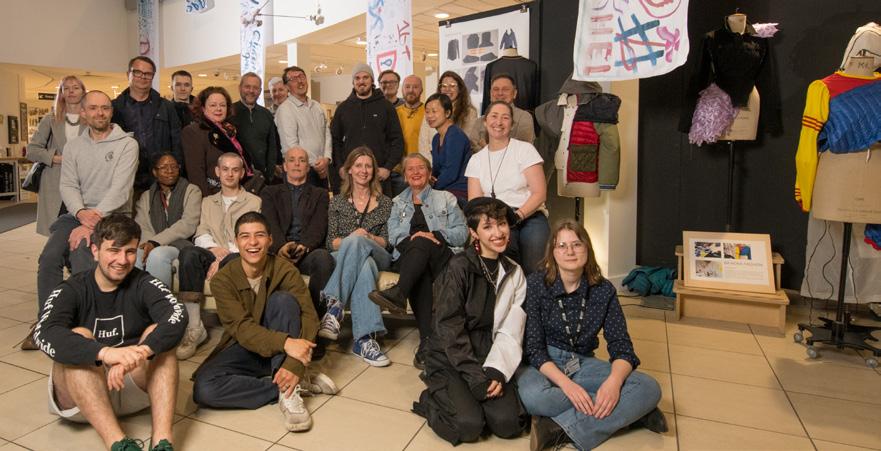
Hundreds inspired by Being Human events
Almost 7,000 participants from across the UK registered for the online event held across two days in November, providing more than 40 virtual events and live broadcasts, to coincide with COP27.
The aim of the festival was to harness the power of the UK’s design and business communities to help create ways out of the climate crisis, while more than 60 guest speakers from disciplines including energy, food waste, biodiversity, supply chains and design, were also on hand to share ways that participants could take action as individuals.
Professor Steven Kyffin, former Pro ViceChancellor for Business and Enterprise at Northumbria, gave a welcome speech at the online event alongside Minnie Moll, Design Council Chief Executive.
And there was no shortage of activity at Northumbria with staff and students taking part in a carefully curated schedule of in-person activities which ran in parallel with the online festival to embrace the key event theme of ‘action’.
Dr Heather Robson, Head of Northumbria School of Design, said: “Our students and staff took part in a series of Design Sprints, organised as part of the event, which were aimed at finding solutions to climate-focused design problems. Students from Fashion, Industrial Design and Communication Design programmes also acted as illustrators, capturing the discussion.
“There was a real buzz in the School of Design, where we had an exhibition of work by Design, Fashion and Architecture students in the Foyer, including the Northumbria University Climate Action Network (NUCAN) group of students from Architecture and the Built Environment who are passionate about taking a sustainable, designfocused approach to their work.”
The festival is the subject of a number of special episodes from Northumbria School of Design’s own podcast, Designamite, led by Senior Research Assistants Helen Simmons and Dr Nkumbu Mutambo. The podcast is available on Spotify.
To read more about the Design for Planet Festival, click the QR code.
Some of the North East’s most celebrated treasures were the focus of a series of events organised by Northumbria University as part of the 2022 Being Human Festival – with people of all ages taking part in activities from rebuilding Hadrian’s Wall in Lego to binding their own books.
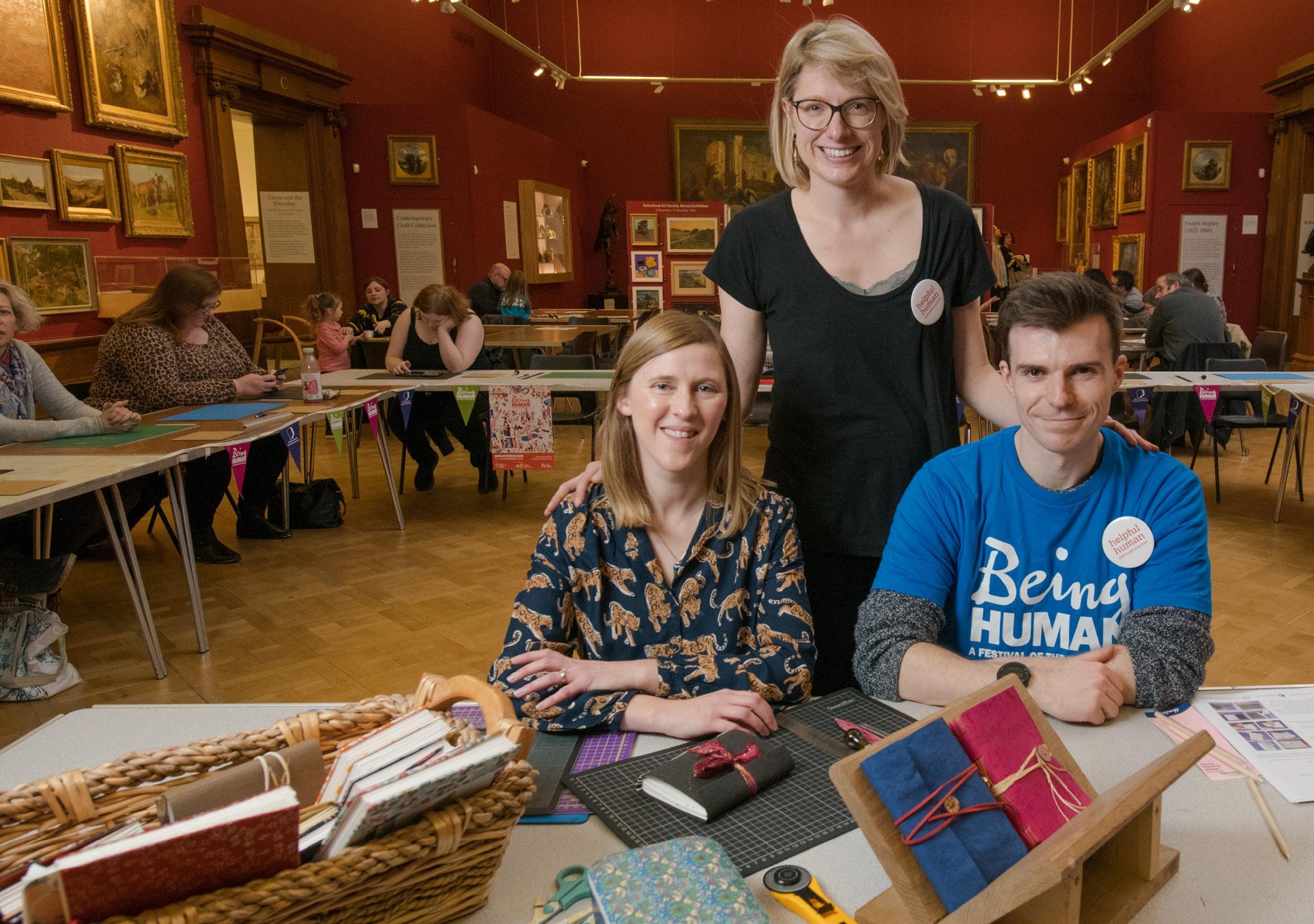
The Being Human Festival is the UK’s national festival of the humanities, with hundreds of events taking place throughout the country each November, demonstrating and celebrating the ways in which humanities-based subjects inspire and enrich our everyday lives.
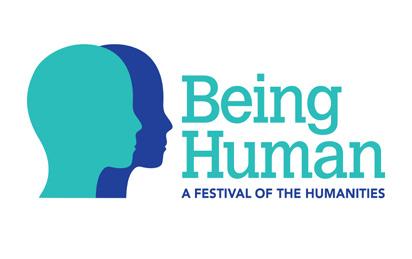
Northumbria University was one of only five institutions selected as a Research Hub for the 2022 festival, winning funding to deliver a programme of events called Treasures of the North East. The University worked in partnership with Tyne & Wear Archives & Museums, St. James’ Heritage and Environment Group, bookbinder Alexandra Marsden, and LEGO artist Steve Mayes of Brick This to organise and host the events. Two of the region’s landmark treasures, the Lindisfarne Gospels and Hadrian’s Wall, were the inspiration behind many of the activities taking place.
The festival launched on 10 November with an event at the Great North Museum: Hancock, which included a variety of events. A LEGO Serious Play session allowed people to explore their connection to Hadrian’s Wall, while an interactive workshop gave an insight into what northern English sounded like 1,000 years ago, including a reading of the Lindisfarne Gospels. There was a performance of the play From You To Me, featuring the voices and stories of people who lived in post-war Tyneside, as well as a screening of the film Gannin’ Alang the Wall, which focuses on the oftenoverlooked sections of Hadrian’s Wall. Visitors were also able to help rebuild Hadrian’s Wall with LEGO, alongside the museum’s scale model. The launch event was followed by a week of activities which included walking lesser-known sections of Hadrian’s Wall, bookbinding, and creative writing.
Dr Gareth Roddy, a Leverhulme Early Career Fellow in the Department of Humanities at the University, and Dr Claudine van Hensbergen, an Associate Professor of 18th century English Literature, led the programme of events on behalf of Northumbria University. Dr Roddy said: “Treasures of the North East was a roaring success thanks to the dedication and hard work of Northumbria University’s academics and our community partners. Together, and with generous funding from Being Human and Northumbria University, we delivered fun, engaging, creative, and meaningful activities that attracted hundreds of people to venues across Newcastle and Gateshead.”
Click the QR code to find out more about the Being Human festival.


12 NEWS Northumbria University NEWS • Spring 2023
DR GARETH RODDY
“TREASURES OF THE NORTH EAST WAS A ROARING SUCCESS THANKS TO THE DEDICATION AND HARD WORK OF NORTHUMBRIA UNIVERSITY’S ACADEMICS AND OUR COMMUNITY PARTNERS.”
FROM L-R: BOOKBINDER ALEXANDRA MARSDEN, DR CLAUDINE VAN HENSBERGEN AND DR GARETH RODDY AT THE BOOKS AS TREASURES BEING HUMAN EVENT.
Employability scheme gives students a head start
When the Covid-19 pandemic hit in 2020, student life changed dramatically – including the opportunities available to access paid work experience. In response, Northumbria set up NU:Opportunities – a Universitywide scheme which provides students with the opportunity to gain experience in an area they are interested in, and get paid for it.
Launched in summer 2021, NU:Opportunities matches individuals and teams across the University looking for support on research or work projects, with students looking for paid work experience. From research roles working alongside academics, to software development opportunities within the University’s IT department, the variety of experiences available is vast. Internships last up to 100 hours in total and can be arranged to fit around studies, allowing students to work flexibly parttime and within a field they have a particular interest in. The scheme is funded by the University and, following the successful pilot in 2021, an investment of £500,000 was made to open the scheme more widely in 2022/23. A similar investment has already been confirmed for the next academic year, 2023/24, which will enable an additional 20 year-long placements, taking the total number of year-long placements available at the University up to 35. A report from the Department for Education cites undertaking paid work while at university as one of the key factors in enabling positive outcomes for graduates. NU:Opportunities provides students with the opportunity to gain valuable experience and develop key transferable skills, potentially providing them with a significant edge in a competitive job market, as well as helpful insight into the types of roles they might be interested in post-university. It is also hugely beneficial to the University, bringing new ideas, skills, insights and perspectives to projects and initiatives.
Professor Leigh Riby, of Northumbria University’s Department of Psychology, employed a student intern through NU:Opportunities when the scheme first launched in 2021, and was keen to repeat the process for his new research project, the Neuroscience of Music. He was looking for a student to support in all areas, from initial discussions and recruitment of participants, to testing, and drafting a research paper. The successful candidate, Sam Fenwick, joined Professor Riby and his team in December and will spend 100 hours working alongside them, including contributing to a research paper on which she will be a named coauthor.
Professor Riby said: “Having taken on an intern before I know the value they can bring to an academic research project. I also know how beneficial an internship is for the student and have always been determined to try and offer these types of opportunities to work alongside academics on an active research project.
“This particular project is investigating how listening to different types of music can have an impact on an individual’s wellbeing, and part of Sam’s role will be measuring brain activity in participants while they listen to different music. Not only will she be able to experience what it is like to work as a researcher, she will also develop some key skills and experience which she can add to her CV.”

Commenting on her internship, Sam said: “Being part of this project has been beneficial to me in so many ways. As an aspiring academic, I need substantial


research experience to progress onto a PhD of my own. Leigh has listened to my goals and has supported me every step of the way.”
Academics from Northumbria’s Centre for International Development have recently taken on three student interns through the NU:Opportunities programme – Emily McAuliffe, Ana Moreno Merino, and Adunola Bello. Research Fellows Inge Boudewijn and Bianca Fadel were involved in the recruitment process and now oversee the interns’ activities. They believe the scheme benefits both the students and the academics they work alongside. As Inge explained: “The students bring a great fresh perspective to the work we are doing and
allow us to think about how we communicate our research, especially to a younger audience. Their insight is really valuable, and they have already been helping to set up a newsletter, as well as updating the Centre’s webpages.
Intern Emily said: “I was drawn to apply for this internship as it’s incredibly difficult and competitive to gain experience within this sector - especially paid experience.”
Fellow intern Ana continued: “As part of my role, I’m learning how to use software for data analysis and various other skills which will be useful to me as I continue in my career.”

Adunola added: “By working with academics in the department, I have gained a practical
understanding of development intervention projects –something which will be important in my future career.”
NU:Opportunities is one of the services provided by Northumbria’s Graduate Futures Team, which provides specialist careers guidance, employability advice, and careers clinics. Northumbria is in the top 25 universities across the country for the number of full-time UK graduates who go into skilled jobs.
Click the QR code to find out more about Graduate Futures.

13 #TakeOnTomorrow
“THE STUDENTS BRING A GREAT FRESH PERSPECTIVE TO THE WORK WE ARE DOING AND ALLOW US TO THINK ABOUT HOW WE COMMUNICATE OUR RESEARCH, ESPECIALLY TO A YOUNGER AUDIENCE.”
RESEARCH FELLOW INGE BOUDEWIJN
STUDENT INTERN SAM FENWICK PICTURED CARRYING OUT A BRAIN MAPPING ACTIVITY AS PART OF THE NEUROSCIENCE OF MUSIC RESEARCH PROJECT.
ADUNOLA BELLO
EMILY MCAULIFFE
NEWS
ANA MORENO MERINO
Technician takeover
The unique contributions of university technical support staff, and the diversity of the work they carry out, was celebrated during a special exhibition held at Northumbria University called Variantia.
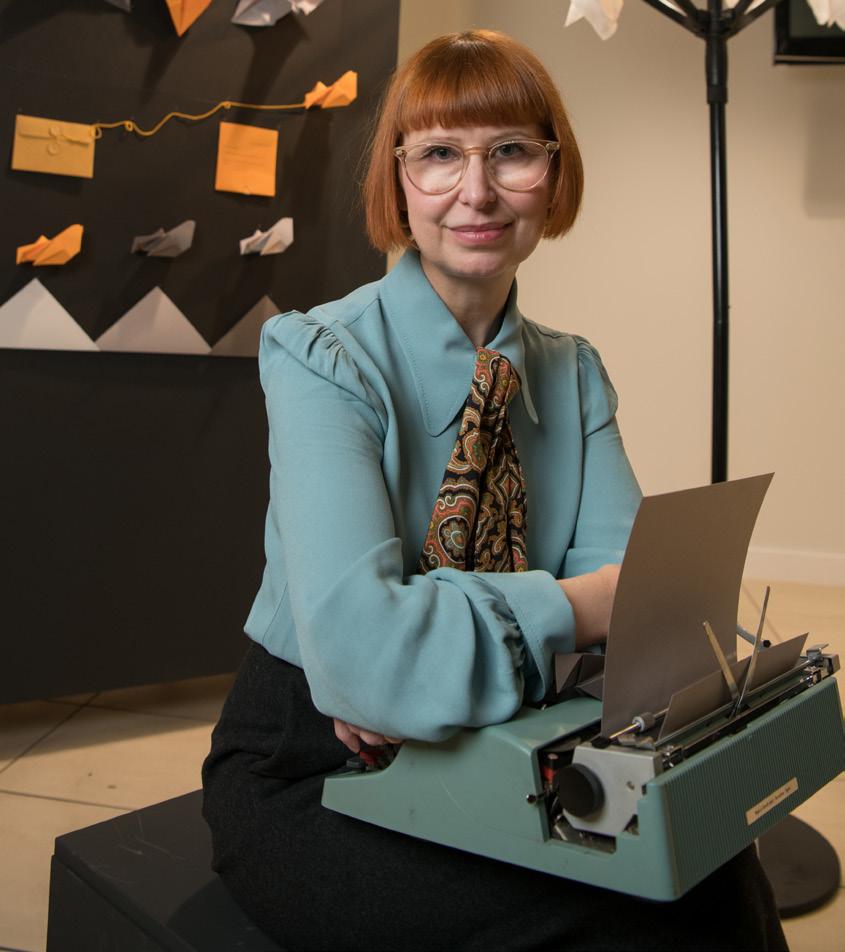
Northumbria became a signatory of the Technician Commitment back in 2021, pledging to support the Higher Education initiative led by a steering board of sector bodies, with support from the Science Council and the Gatsby Charitable Foundation’s Technicians Make It Happen campaign. The commitment aims to promote visibility, sustainability, recognition and career development for all technical staff.
The Variantia showcase, held in December, brought Technicians from the Faculty of Arts, Design and Social Sciences together to stage an exhibition of personal and professionally completed work, with examples of fine art, fashion, graphic, interior and 3D design on display.
The aim was to inspire students and to stimulate new collaborations among staff to inform and shape their teaching and interdisciplinary research.
Kenny Macrae, Technical Support Manager, said:
“Many of the technical team are creative people in their own right with personal work and research to demonstrate their own skills and interests.”
Senior Technician, Jennine Wilson from Northumbria School of Design was one of the members of staff who displayed their work, Correspondence Birds Bureau at the exhibition. Jennine’s work embraces the art of correspondence, appreciating the connection with others through mail art and receiving a physical letter.
“Photography is my background. Fine art photography or conceptual photography is at the heart of what I do. But like many

creative people, I often have a few projects bubbling away,” she said.
“I try to incorporate as much consideration and consciousness into my art processes through curiosity, experimentation, and chance. These processes are often conceived through conversations with others. This both consciously and unconsciously allows me to create a dialogue with students and work with them to reimagine and develop their own work.”
Senior Specialist Technician, Mike Skinner works in Industrial Design supporting students with model making and 3D realisation of design concepts. Mike exhibited Blue which is a number of hollow wooden surfboards, made predominantly using recycled or reclaimed building materials. “Technicians who work in creative subjects

often have creative interests outside of their field of specialism,” he said.“I enjoy sustainable construction and challenging myself in terms of the complexities of the manufacture. And even though this doesn’t necessarily link to a taught programme, I think students engage with the different concepts which influence their own practice.”
The Variantia exhibition - which was open to staff, students and the public – was the latest showcase of work from Northumbria Technicians and future exhibitions are already being considered as part of Northumbria’s commitment to highlighting the skills and

creativity of colleagues.
Dr Solomon Lennox, Head of Arts, said: “It is the expertise and craftsmanship of these colleagues that make the Faculty of Arts Design and Social Sciences a leading centre of research-enriched creativity.”
14 Northumbria University NEWS • Spring 2023
Click the QR code to watch a video about the Variantia exhibition.
Below: L-R Mike Skinner, Jennine Wilson, Kenny Macrae and Keith Holmes
“IT IS THE EXPERTISE AND CRAFTSMANSHIP OF THESE COLLEAGUES THAT MAKE THE FACULTY OF ARTS DESIGN AND SOCIAL SCIENCES A LEADING CENTRE OF RESEARCHENRICHED CREATIVITY.”
DR SOLOMON LENNOX, HEAD OF ARTS
The secrets of ‘superhero’ seagrass
KEY FACTS
One square kilometre of seagrass was found to produce more than 700 tonnes of sediment per year
New research has uncovered evidence that tropical seagrass meadows could provide a crucial line of defence against the impacts of climate change on coral reef islands in regions such as the Maldives.

According to the work of a research team led by Dr Holly East of Northumbria University, the sediment-producing properties of these underwater ecosystems have been shown to be important sources of sand that can both build and maintain coral reef islands in the face of sea level rise. It has long been known that seagrass provides many valuable societal benefits, with seagrass meadows recognised as biodiversity hotspots, capable of storing carbon to slow climate change, and protecting land from coastal erosion.
But the new research study, which is published in the journal Nature Communications Earth and Environment, provides the first evidence of the volume of
sediment produced by a seagrass meadow in a reef island setting.
Dr East, who works within Northumbria’s department of Geography and Environmental Sciences specialising in the ecology of tropical coastal environments, said: “Seagrasses may not look like superheroes, but these underwater meadows provide important benefits to society.
“Seagrass meadows are commonly found close to reef islands, but their potential role as sources of reef island-building sediments has been overlooked.
Our findings quantify the rate of sediment production from
seagrass meadows, and the proportion of that sediment which is of the right type to contribute to coral reef island-building.”
Seagrass leaves have tiny living creatures known as epibionts living on them. These epibionts are made of calcium carbonate which creates sand when the seagrass leaves die or when the epibionts fall off the leaves. Sediment is then transported by waves and can be deposited on nearby islands.
Dr East and the research team studied seagrass meadows and epibionts in the southern Maldives. Using satellite imagery, the team mapped the different

areas of the seagrass meadow and manually counted the number of seagrass leaves, using grids placed on the sea floor to accurately establish the densities of seagrass leaves in the area.
They then analysed hundreds of seagrass leaves in their lab and were able to calculate the size and mass of the epibionts living within the meadow – and how much sediment they would generate.
“The ability of seagrass meadows to produce sediments that can build and maintain coral reef island shorelines may help the islands grow to remain resilient to rising sea levels,” explained Dr East. “Their very survival may be dependent on the sand produced by these incredible underwater seagrass meadows.”
Two thirds of the 700 tonnes of sediment produced annually was found to be sand-sized and suitable for island building
A seagrass meadow of one square kilometre in size could produce enough sediment to build an island the size of the coral reef island of Faathihutta, which neighbours the study site in the Maldives, in less than 20 years

She added that the findings reinforced the need for governments to work with the tourist industry to conserve seagrass meadows.
“Seagrasses are actively removed by the tourist industry in many regions as pristine white sands are considered more aesthetically appealing,” she added. “Our findings present a new and compelling geomorphic argument for seagrass conservation.”
Click the QR code to to read the journal article article in Nature Communications Earth and Environment.

15 #TakeOnTomorrow
DR HOLLY
EAST
“OUR FINDINGS PRESENT A NEW AND COMPELLING GEOMORPHIC ARGUMENT FOR SEAGRASS CONSERVATION.”
Below: Dr Holly East and the research team studied an area of the southern Maldives.
SEAGRASS MEADOWS ARE COMMONLY FOUND CLOSE TO REEF ISLANDS, BUT THEIR POTENTIAL ROLE AS SOURCES OF REEF ISLAND-BUILDING SEDIMENTS HAS BEEN OVERLOOKED.
Improving the air that we breathe
A researcher at Northumbria University has become a regional lynchpin in the UK’s efforts towards achieving better air quality.
Professor Anil Namdeo, Professor of Air Quality Management in the University’s Department of Geography and Environmental Sciences, has been appointed by the UK Research and Innovation (UKRI) SPF Clean Air Champions Team as its Regional Clean Air Champion (RCAC) for the area which stretches from the East Midlands to the North East of England.

The role, which Professor Namdeo will hold for two-and-a-half years, positions him as the region’s central point for air quality research. He will work to improve collaboration and increase impact across and beyond the Strategic Priorities Fund (SPF) Clean Air Programme – a £42.5m UKRI funded programme that supports highquality research and innovation to help develop practical solutions for today’s air quality issues. As well as connecting with researchers that form part of the SPF Clean Air Programme, Professor Namdeo will identify challenges and barriers standing in the way of regional advancements and feed these into the programme.
A Chartered Environmentalist and Chartered Scientist, Professor Namdeo is a Fellow of the Royal Meteorological Society (FRMetS) and a Fellow of the Institute of Air Quality Management, having worked extensively in Africa, Asia, Europe and South America. With a particular interest in environmental justice, his research bridges the gap between engineering, social science and public health.
“Regional Clean Air Champion is a position I’m very proud to hold and I’m passionate about its importance in improving the quality of the air we all breathe,” said Professor Namdeo. “I’m especially looking forward to working with leading academics to engage with those in business and industry, health professionals, local authorities and the public to ensure future air quality policies and developments are based on quality research.”
Northumbria University is ranked second in the UK for its research impact in Geography and Environmental Sciences, with 90 per cent of its studies rated as either world-leading or internationally excellent.
To read more about this story, click the QR code.
Fossils offer clues to UK’s climatic past – and future
“OUR STUDY SUGGESTS AN ANTICIPATED WARMER AND WETTER CLIMATE FOR THE UK, WHICH OF COURSE HAS IMPLICATIONS FOR ALL OF US.”
DR MATTHEW POUND, ASSOCIATE PROFESSOR, GEOGRAPHY AND ENVIRONMENTAL SCIENCES

Researchers have gained an insight into what the climate of the UK would have been like around 12 million years ago by examining fossilised plants and fungi from the Peak District.


An international team of academics, led by Dr Matthew Pound of Northumbria University, analysed rock deposits near the village of Brassington in Derbyshire, which contained fossilised pollen and spores. Because plants and fungi generally favour very particular conditions, the researchers were able to then build a picture of what the environment in the area would have been like when the plants were alive, 12 million years ago. While today the mean annual temperature in Derbyshire is around 8°C, with up to 1,000mm of rain a year, the fossil findings reveal that 12 million years ago the environment was warmer and wetter, with an average temperature of 12-18°C and 1,2001,400mm of rain.
As well as providing a fascinating glimpse into what the UK might have looked like during this time, the findings also serve as a warning to how our current environment might alter if climate change continues unchecked. Analysis of the fossils also revealed that the levels of atmospheric carbon dioxide during that period were at a
level scientists predict will occur again by 2060, potentially leading to an increase in temperature and rainfall which could fundamentally change the entire landscape. This highlights how important carbon capture is to avoid extreme changes in climate.
Dr Matthew Pound, a member of Northumbria’s Department of Geography and Environmental Sciences, explains: “Fossil plants and fungi can tell us a lot about a place – even from 12 million years ago. That’s why when choosing a nice sunny holiday you’d always pick palm trees over Christmas trees, and why I always end up with green tomatoes in the north of England!
“Our study suggests an anticipated warmer and wetter climate for the UK, which of course has implications for all of us; but also provides an opportunity to ensure landscapes like the Peak District and Derbyshire can be part of that resilience, not just for local communities but at scale as we manage the carbon in our environment.”
With some of the most extensive upland landscapes and peat bogs in
the UK and globally, the Peak District is already at the forefront of carbon capture or ‘sequestration’ through conservation management and restoration programmes, but also has a role to play in mitigating the potential localised impacts of climate change through natural flood management.Anna Badcock, Team Leader for Cultural Heritage at the Peak District National Park added:
“This work is incredibly powerful in helping us communicate ideas about landscape change. Researchers use fossil pollen for reconstructing past environments and understanding human impacts on landscape, but this is recent in geological terms. It’s wonderful that advances in this kind of analysis can also be used to help us understand climate and environments millions of years ago – we still have such an extraordinary amount to learn from fungi and plants, and about how our environments adapt.”
Click the QR code to find out more about Northumbria’s Department of Geography and Environmental Sciences.


16 Northumbria University NEWS • Spring 2023
Tackling the global plastic crisis through sustainable alternatives

PLASTIC NOT FANTASTIC:
The world produces about 400 million tonnes of plastic waste a year. (www.ourworldindata.org)
Emissions from plastic are projected to exceed 2.5 billion metric tonnes by 2050 if the current pace of growth and manner of production continue.
(www.ciel.org)
It is estimated that at least 14 million tonnes of plastic enter our oceans every year.
(www.iucn.org)
By 2050
we are estimated to have more plastic in our oceans than fish (by weight).
(www.wwf.org.uk)
Approximately
Academics from Northumbria University have developed a new biopolymer, a plastic-like material, which is stronger, safer, and more sustainable than plastic.
The convenience plastic offers is undeniable and there’s no doubt life as we know it today would be unrecognisable without it. Plastics help us to create life-saving equipment, keep the food we eat fresh, make space travel possible and produce lighter vehicles — saving fuel and reducing pollution. In fact, if you look around, you will inevitably find most things contain plastic, including pens, laptops and even clothes. However, the usefulness of plastic comes at a huge environmental cost. From colossal waste, recycling and climate change impacts, to its threat to human and wildlife health, plastic pollution has become one of the most critical environmental challenges of our time.
A team of Northumbria researchers led by Dr Ulugbek Azimov, Associate Professor of Mechanical Engineering, has developed what could be a plastic alternative game-changer. The new material is derived from organic matter meaning it is non-toxic and therefore could be used for a wide variety of purposes, including in food packaging and as an alternative to plastic bags.
It can also be dissolved in warm water, with the liquid then used as a fertiliser – meaning it is completely sustainable. And unlike plastic, which is highly flammable, the new biopolymer is flame retardant, making it much safer and widening its potential use to include construction.
Describing the additional qualities and potential applications of the new material, Dr Azimov explained: “The new biopolymer can conduct electricity, so can be used in electronics applications, medical devices, food processing systems, military and defence, and industrial applications. It also has a very high relative permittivity (the ability of a substance to store electrical energy in an electric field), which means it can be used in supercapacitors to store high electrical charges and could also be used within the electric vehicle industry. Supercapacitors are used in applications requiring rapid charge and discharge cycles, rather than long-term compact energy storage. For example, in cars, buses, trains, cranes and elevators, for regenerative braking, shortterm energy storage, or burst-mode power delivery.
With the rapid growth in the electrification of transport, the number of these supercapacitors will significantly increase in the future, requiring proper utilisation and recycling of their materials, which this new biopolymer will allow for.”
The biopolymer also addresses the global challenge of plastic pollution, with no waste generated in its production and zero-carbon recyclability.
Dr Azimov is now seeking industrial partners to work with to develop the material further, leading to the commercialisation of the product, and added: “Based on the multifunctionality of the new biopolymer material, we are developing products for different commercial applications through a cost-effective, zero-carbon process which addresses the circular economy.”
Click the QR code to watch a video demonstrating the features of the new biopolymer.

36 per cent
of all plastics produced are used in packaging, including single-use plastic products, approximately 85 per cent of which ends up in landfills or as unregulated waste.
Going green for hedgehog Gold
Northumbria University has achieved the Gold Award for a Hedgehog Friendly Campus.

Hedgehogs are vulnerable to extinction in Britain, facing challenges such as limited access to food and water, habitat loss, road traffic and litter. Green spaces can provide a refuge and as a result the British Hedgehog Preservation Society has funded the Hedgehog Friendly Campus scheme designed to protect them, enhance their habitat and raise awareness about hedgehog protection. This year, 92 UK educational institutions applied to be a Hedgehog Friendly Campus and took steps to help hedgehog populations, including with litter picks, surveys, crossing signs and hedgehog hotels placed on site.
Northumbria was one of the first universities to sign up to the scheme in 2019 and is proud to have achieved Gold Accreditation, shortly after being named top university in the North East for sustainability in the latest People & Planet University league table.
17 #TakeOnTomorrow
DR ULUGBEK AZIMOV
“BASED ON THE MULTIFUNCTIONALITY OF THE NEW BIOPOLYMER MATERIAL, WE ARE DEVELOPING PRODUCTS FOR DIFFERENT COMMERCIAL APPLICATIONS THROUGH A COSTEFFECTIVE, ZERO-CARBON PROCESS WHICH ADDRESSES THE CIRCULAR ECONOMY.”
Stories of strength
The experiences of Sahrawi women peacefully protesting against the Moroccan occupation of Western Sahara will be recorded as part of a new project by a Northumbria University academic.


Dr Joanna Allan, Assistant Professor in Human Geography Policy and Development, has been awarded a Philip Leverhulme Prize, worth £100,000, to carry out the research which will explore the lives of four women and their participation in nonviolent resistance movements against colonialism and Moroccan occupation of their home country.
Dr Allan’s work aims to raise global awareness of Western Sahara’s occupation which, due to restrictions by the Moroccan authorities on journalists and human rights activists entering the country, has had little media coverage.
Her research will also explore different cultural understandings of ‘environmental justice’ and what these mean for transforming the global food system. It will focus specifically on cultural representations of phosphates; a natural resource used as fertiliser in food production, and the role it plays in ongoing political and environmental conflicts in North America and Spain.
Philip Leverhulme Prizes are awarded by the Leverhulme Trust to researchers at an early stage of their careers whose work has had international impact and whose future research careers are exceptionally promising. With more than 300 nominations each year, Dr Allan is one of just 30 academics selected to receive the prize in 2022.

Speaking about her research, Dr Allan said: “I am deeply grateful and honoured to have been selected by the Leverhulme Trust for this prize. The funding will have a transformational impact on my work, allowing me to take my research on women’s anti-colonial resistance and environmental justice in new directions.
“There is increasing research on how women have participated in nonviolent resistance movements against colonialism, occupation, and war. However, we know little about how such cultural activists attempt to change the ‘hearts and minds’ of the people their protests are aimed at. I hope to expand such knowledge through the Four Women project,
as well as to contribute to the theorisation of culture’s role in nonviolent movements globally.”
Dr Allan is a member of Northumbria University’s Centre for International Development. Speaking about her success, Centre Co-Director Professor Katy Jenkins said: “We are delighted that Dr Allan’s innovative research has been recognised with this prestigious award. Her internationally significant research makes an important contribution to
the Centre for International Development’s cutting-edge interdisciplinary research on environmental activism and resistance in the global South.” Professor John Woodward, Pro Vice-Chancellor for Northumbria’s Faculty of Engineering and Environment added: “The Philip Leverhulme Awards recognise outstanding researchers with promising careers ahead of them. Dr Allan’s selection from such a strong field of candidates is impressive
recognition of her excellent contribution and is a clear sign of the ever-growing body of excellent research and worldclass researchers we have here at Northumbria University.”
Click the QR code to find out more about the Philip Leverhulme Prize.

“THE PHILIP LEVERHULME AWARDS RECOGNISE OUTSTANDING RESEARCHERS WITH PROMISING CAREERS AHEAD OF THEM. DR ALLAN’S SELECTION FROM SUCH A STRONG FIELD OF CANDIDATES IS IMPRESSIVE RECOGNITION OF HER EXCELLENT CONTRIBUTION AND IS A CLEAR SIGN OF THE EVERGROWING BODY OF EXCELLENT RESEARCH AND WORLD-CLASS RESEARCHERS WE HAVE HERE AT NORTHUMBRIA UNIVERSITY.”
PROFESSOR JOHN WOODWARD, PRO
VICE-CHANCELLOR
FOR NORTHUMBRIA’S FACULTY OF ENGINEERING AND ENVIRONMENT
18 Northumbria University NEWS • Spring 2023
Below: Sahrawi women pictured in refugee camps in Algeria.
Giving a voice to unheard stories
The culture and history of Afro-Ecuadorian women – meaning those of African descent – has been recorded and celebrated for the first time through a Northumbria University-led research project.
Up until now the voices of black women living in the Esmeraldas province of Ecuador in South America have been largely unheard, despite the fact the area has the highest percentage of Afro-descendant population in all of Ecuador. But now their rich heritage, passed down from generation to generation through the spoken word, has been documented through a research project.
Over the last three years, academics from Northumbria University and Universidad San Francisco de Quito in Ecuador, alongside partners from the Black feminist creative arts organisation Mujeres de Asfalto collective, have worked together to explore, document and celebrate the experiences of Afro-Ecuadorian women through the RECLAMA project. Funded by The British Academy and the Global Challenges Research Fund’s (GCRF) Heritage, Dignity and Violence fund, the RECLAMA project aims to document the rich heritage of Afrodescendant-black women living in Esmeraldas Province. Through RECLAMA, 16 AfroEcuadorian women have been trained as peer researchers to carry out life history interviews and capture the knowledge of older generations living across different districts, so that their stories can be recorded and made accessible as part of a permanent community archive. During the 60 interviews, themes including dance, poetry and song, traditional dress, food and cookery, and religious and spiritual practices all began to
emerge. A series of photographs, documentaries and works of art have since been created to capture each theme.
Many of the Afro-descendant population living in the Esmeraldas province face poverty and marginalisation, with 57 per cent living without basic needs – a figure which rises to over 80 per cent outside of the province capital. Adding to the difficulties, last year the Ecuadorian government announced a “state of exception” in the Esmeraldas, after gang wars resulted in the deaths of several police officers. This came just weeks after an earthquake left thousands in the province homeless.
Northumbria’s Professor of International Development Katy Jenkins, who has led the project, said: “In this context
of violence and precarity, it is more important than ever to recognise not just the unique and complicated struggles Afro-descendant women face, but also to provide a platform for their historically excluded knowledge, practices and visions for alternative development.

“The Afro-descended community in Esmeraldas suffer negative impacts from the extraction of natural resources from the environment they live in, alongside high levels of gendered violence, with very few positive representations of black and Afro women, who are often completely invisible. The focus of this research has been to make a contribution towards
amplifying their rich culture and identity and making sure it is recognised and valued.”
Juana Francis Bone, Director of the Mujeres de Asfalto collective, added: “Grabbing hold of our history in this moment is the only way to mark out a better future. They have always denied us our history, and I believe that telling it resignifies it, so that we become the narrators and protagonists of our own history.”
RECLAMA is just one of the research projects led by academics from Northumbria’s

Centre for Global Development, co-directed by Professor Jenkins, which addresses the global challenges faced in the areas of volunteering, citizenship and civil society. To find out more about the RECLAMA project, click the QR code.

19 #TakeOnTomorrow
PARTICIPANTS OF THE RECLAMA PROJECT HIGHLIGHTED FOOD AND GASTRONOMY AS KEY ASPECTS OF THEIR CULTURAL HERITAGE TO BE CELEBRATED.
A driving force in road safety
Carbon dioxide and water could be recycled into renewable future fuels under a new system being developed by engineering experts at Northumbria University.
Professor Ahmed Elmarakbi, based in the University’s Department of Mechanical and Construction Engineering, has been invited to join the European Lightweight Cluster Alliance (ELCA). The Alliance brings together world-class researchers to work across some of the world’s best facilities, with the ambition to address the needs and challenges of industries such as mobility, energy, healthcare, defence and construction.
Professor Elmarakbi was selected as a direct result of his work in initiating and developing a project called SALIENT, which is funded by the EU’s key programme for research and innovation, Horizon Europe. SALIENT, an important
three-year study, will lead to the design of safer, lighter, smarter vehicle structures that can absorb more high energy impact in a crash situation, meaning fewer serious injuries and fatalities on our roads. Professor Elmarakbi explained: “It’s fantastic to officially be part of such an important alliance, which will lead to further EU projects and funding opportunities, allowing Northumbria University to collaborate further with industry, and disseminate the findings of our research more widely to maximise its impact. Being part of ELCA will bring us closer to realising the aims of the project around better road safety for all.
“Automotive industries, which
yield an average of more than £2.4 trillion a year, contribute towards almost three-and-ahalf per cent of the world Gross Domestic Product, so this could also have a significant impact on socio-economic growth and development, as well as helping create next generation vehicles that are safer than any we’ve seen before.”
Professor John Woodward, Pro Vice-Chancellor of the Faculty of Engineering and Environment, said: “We’re honoured that the expertise and hard work of a member of our team has been recognised in this way, and congratulate Professor Elmarakbi on this invitation to contribute to such an important initiative.
“IT’S FANTASTIC TO OFFICIALLY BE PART OF SUCH AN IMPORTANT ALLIANCE, WHICH WILL LEAD TO FURTHER EU PROJECTS AND FUNDING OPPORTUNITIES, ALLOWING NORTHUMBRIA UNIVERSITY TO COLLABORATE FURTHER WITH INDUSTRY, AND DISSEMINATE THE FINDINGS OF OUR RESEARCH MORE WIDELY TO MAXIMISE ITS IMPACT.”
We look forward to supporting him and his colleagues as SALIENT develops.”
ELCA Coordinator Ricardo del Valle added: “Having Professor Elmarakbi and Northumbria University on board allows us to reinforce our positioning in automotive innovation and connects us with one of the top institutions in the world for addressing future challenges.”
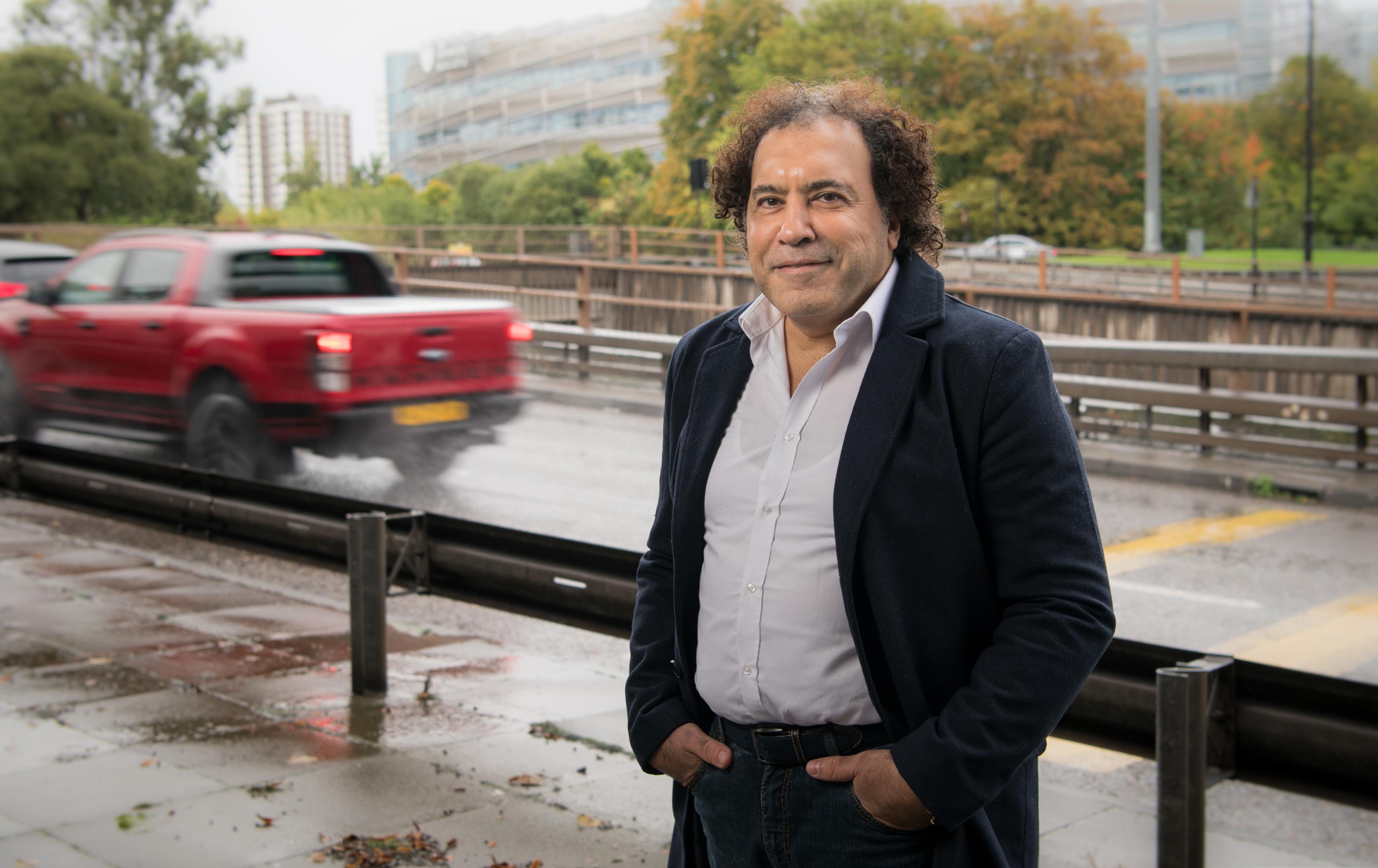
Northumbria University is ranked highly for its engineering research power in the Research
Excellence Framework (REF) 2021 - the official system for assessing the quality of research in UK higher education institutionswith 90 per cent of its studies rated as either world-leading or internationally excellent.
To find out more about the SALIENT project, click the QR code.

20 Northumbria University NEWS • Spring 2023
PROFESSOR AHMED ELMARAKBI
PROFESSOR AHMED ELMARAKBI
Arts research inspires new approaches to emergency planning
As the UK Covid-19 inquiry continues and the country’s pandemic preparedness is examined, performance research is making a significant impact on the future of emergency planning in the UK and beyond.
Dr Patrick Duggan, Associate Professor in Drama at Northumbria University and Dr Stuart Andrews, Senior Lecturer in Theatre at Brunel University London began their 21-month project, ‘Social Distancing and Reimagining City Life: Performative strategies and practices for response and recovery in and beyond lockdown’, in December 2020. Their research, funded by the Arts and Humanities Research Council (AHRC) investigates the ways in which arts, culture and performance can open up new perspectives on city emergency and resilience strategy and practice for Covid-19 and future emergencies.
The Emergency Planning Society (EPS) - the UK’s leading membership body for professionals working or studying in disaster management, emergency response and resilience - began working with Dr Duggan and Dr Andrews after reading their interim project
report. Jeannie Barr, Interim Chair, EPS, explained that the research had a swift impact on the Society’s work: “Their work has led to several key changes that will be of significant benefit to the Society’s membership, and to our understandings of what good emergency planning looks like. This positively impacts on how we might help support our members to develop their professional practice, which will have significant wider societal benefits.”
The EPS invited the academics to develop what Dr Duggan and Dr Andrews ultimately termed ‘A Toolkit of Creative Strategies for Personal Debriefing’. Previously, debriefing after an incident was conducted at an organisational or an inter-agency level, not at an individual or a team level.
Ms Barr explained how the new toolkit offers an alternative way of working: “The toolkit provides an enormously beneficial new approach to debriefing that centres on individuals and teams.
It opens the space for individuals to consider things from a different perspective, to use skills such as creative thinking as an approach to problem solving, and reduces fear of change, providing some tools that will support an individual with the emotional aspects of crisis and acceptance of the need for change. So important is this contribution that it has been integrated into our recently updated core competencies framework.”
Other organisations that benefitted from the research include Northumberland County Council and Bristol County Council, who were involved in the research project from its inception. Jim Gillman, City Operational Planning and Response Manager, Bristol City Council, said: “As we move from a pandemic to a cost of living crisis and we increasingly understand emergencies as wider than ‘no notice, immediate impact events’ this research offers valuable new ‘access routes’ into communities
to talk about risk and resilience. Routes that leave behind the ‘dry’, top down, traditional emergency planning approach and allow a more democratic conversation, driven by the communities and articulated through cultural, performative, and artistic networks, organisations and the content of their outputs. Far more effective than a ‘Community Resilience Plan’!”
Helen Hinds, Business Resilience and Emergency Planning Lead, Northumberland County Council, reinforced the importance of performance methodologies: “Performance can enable difficult conversations and engender a new approach to how we work. It reinforces the need for diverse voices and provides new methods to try something different, to challenge and to not be afraid to be creative.”
This research builds on Andrews’ and Duggan’s existing and established interest in developing productive dialogue between arts and resilience professionals. Their work in the UK, Ireland and the USA

has seen profound impact on organisational development, city-wide strategic planning and policy, and funding priorities.
Professor Andy Long, Vice-Chancellor and Chief Executive at Northumbria University, commented on Northumbria’s strong reputation for driving research which delivers real impact. “It’s great to see this interdisciplinary project make such an impact on the future of emergency planning. Andrews’ and Duggan’s research highlights the need for new approaches to emergency planning and resilience work, especially given the breadth of unprecedented events that hazard mitigation, sustainability and resilience professionals have had to deal with in recent years. It’s also fantastic to see arts research at the forefront of innovations in these essential and complex fields.”
Click the QR code to read more success stories from the project.

21 #TakeOnTomorrow
“IT’S GREAT TO SEE THIS INTERDISCIPLINARY PROJECT MAKE SUCH AN IMPACT ON THE FUTURE OF EMERGENCY PLANNING.”
PROFESSOR ANDY LONG
CREATIVE APPROACHES TO COVID-19 SAFETY MESSAGING: ‘RAINBOW’S END’, BY ZOE ALLEN AND ALLAN DIXON, BALTIC CENTRE FOR CONTEMPORARY ART, AUGUST 2021.
Understanding trauma to help the homeless
A new report commissioned by homelessness charity, Oasis Community Housing and based on research by Dr Adele Irving and Dr Jamie Harding from Northumbria’s Department of Social Sciences, found nearly half of people facing homelessness have experienced at least five or more traumas throughout their lives. This could include sexual or domestic abuse, violence, family death, or war, all of which increase the risk of mental ill-health, inability to concentrate, lack of self-care and substance misuse.

The research concluded that a single incident of trauma, when unaddressed, can have a profound effect on the wellbeing of an individual. However, multiple events or ‘complex trauma’ is likely to impact on every aspect of a person’s being and effect their capacity to access or properly manage
tenancies, creating a vicious cycle of homelessness.
Speaking about the research, Dr Harding said: “The impact of trauma has been an increasingly important theme in homelessness research in recent years and there is a growing realisation that, for the majority of people for whom homelessness is a longer-term issue, trauma is always there in the background of their lives, whether that is from childhood, adolescence, as an adult, or throughout their whole lives.
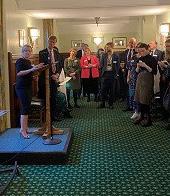
“Our research revealed that a staggering 94% of people facing homelessness have experienced traumas that have left them unable to access the help they need.”
The research provides evidence that specialist mental health and trauma support can end cycles of homelessness. However, almost half of those surveyed had not been able to access specialist help
or had reported only being “taken seriously” after reaching a crisis point.
Establishing trauma-informed care as best practice across homelessness and the related sectors, would not only change the lives of those experiencing such hardship, but also provide significant broader social and economic benefits; from significant net reductions in the average cost of service use, to reducing social harms such as crime and anti-social behaviour and, critically, preventing premature loss of life.
Dr Irving explained: “One important finding which came out of the research is the value of a trauma-informed approach to service delivery which is mindful of the traumatic experiences someone has gone through. This isn’t about creating new services. There are already housing, mental health, and substance misuse services available. However, we need to ask why some individuals are unable to access or engage with those services and why some are returning to those services again and again. But a trauma informed approach may be key to
making it easier for those who need support to access those services.”
David Smith, CEO of Oasis Community Housing, said: “It is futile to try to solve the issue of homelessness without addressing the trauma people have suffered. Frontline staff working in homelessness services must have trauma-informed training to offer appropriate support, as well as helping to protect themselves from vicarious trauma. A national traumainformed training programme, delivered by Government, would save lives as well as taxpayers’ pounds.
“We saw a concerted effort to put a roof over every rough sleeper’s head during the pandemic, but only by recognising and committing to tackle the trauma that is deep-rooted within our homeless population can we even begin to hope to end entrenched homelessness in this country.”
To find out more about the Oasis Community Housing report, click the QR code.

22 Northumbria University NEWS • Spring 2023
DAVID SMITH, CEO OF OASIS COMMUNITY HOUSING
“ONLY BY RECOGNISING AND COMMITTING TO TACKLE THE TRAUMA THAT IS DEEP-ROOTED WITHIN OUR HOMELESS POPULATION CAN WE EVEN BEGIN TO HOPE TO END ENTRENCHED HOMELESSNESS IN THIS COUNTRY.”
New research from Northumbria University has revealed that experiencing multiple traumas throughout life can have a direct impact on a homeless person’s capacity and ability to access support services.
Supporting transplant patients through life-saving surgery
At a time of profound anxiousness for transplant patients and their families, taking in complex information about a heart or lung transplant is difficult. But a new eLearning website, created for heart and lung transplant candidates at Newcastle’s Freeman Hospital, aims to transform the patient experience – providing advice, support, and information, before, during and after surgery.
The online resource, which received a grant of £75,000 from Newcastle Hospitals Charity, was designed following research by academics at Northumbria University’s School of Design, in partnership with heart and lung transplant surgeons and transplant co-ordinators at Newcastle’s Freeman Hospital. The website allows patients to find out everything they need to know about their surgery at their own pace, in a less stressful environment, with any family members they would like by their side.
As well as providing a virtual tour of the transplantation ward, theatres and intensive care unit, patients can meet members of the surgical and nursing team, find out how they can prepare for surgery, what to expect during recovery, and listen to the lived experiences of others.
Once accepted for assessment for transplant, patients are asked to complete a three-part online workbook, covering the assessment process, the operation itself, and life after a transplant. Sections are broken down into bitesize chapters, with any incomplete sections being flagged to the surgical team, which in turn helps them to follow up with anyone who may need additional support or advice.
The new website replaces a largely paper-based system and was initiated by Professor Stephen Clark, a heart and lung transplant surgeon at the Freeman Hospital and a Professor of Cardiothoracic Surgery and Transplantation within Northumbria University’s Department of Applied Sciences. Speaking about the need for a new resource to support transplant patients and their families, Professor Clark said: “The way in which we conveyed complex information to patients and their families as they are assessed to have a heart or lung transplant had not changed for many years and relied on basic printed materials and long faceto-face conversations to impart
“THIS IS A HUGE STEP FORWARD IN THE TRANSPLANT ASSESSMENT PROCESS, AND IS NOT UNDERTAKEN IN THIS WAY ANYWHERE ELSE IN THE UK. IT ALSO OPENS UP OPPORTUNITIES FOR RESEARCH INTO HOW COMPLEX INFORMATION CAN BE BEST EXPLAINED AND SHARED WITH PATIENTS WAITING FOR LIFE-SAVING MAJOR SURGERY.”
PROFESSOR STEPHEN CLARK
difficult and complex concepts around major surgery.
“Developing this cutting-edge digital resource allows families from all over the country who are referred to Newcastle for their surgery to access understandable information. This allows more family members to be involved in the process to support those waiting for a transplant, lets patients view the information more than once if they wish, and frees up staff to focus on the important questions that patients have. This is a huge step forward in the transplant assessment process and is not undertaken in this way anywhere else in the UK. It also opens up further
opportunities for research into how complex information can be best explained and shared with patients waiting for life-saving major surgery.”
The finished website, launched last September, follows several years of research led by Associate Professor Jamie Steane, of Northumbria University’s School of Design. He said: “It was vitally important that in designing this new resource we truly understood the patient journey, so we spent a week shadowing the heart and lung transplant team at the Freeman, speaking to hospital staff and patients. We discovered there was a real information challenge – hospital staff were
going through all the details of the surgery with patients on paper and face-to-face, which we found was not always the best environment or format for patients to properly absorb or retain that information, as well as being very time-consuming. The new online resource really brings the service into the twenty-first century.”
Following the initial research process, Northumbria University appointed digital agency Enigma Interactive as a development partner to create the website, based on the academic team’s findings. Enigma drew on their prior experience of working in health and education sectors to
build an innovative solution. It uses a ‘teach-back’ method of assessing patients’ learning by asking them to select statements, written in familiar language, that best reflect their understanding of the transplant process.
Following the official launch of the website it is now anticipated that the concept could be shared with other hospital transplant centres, or even within other areas of patient care, including diabetes treatment.
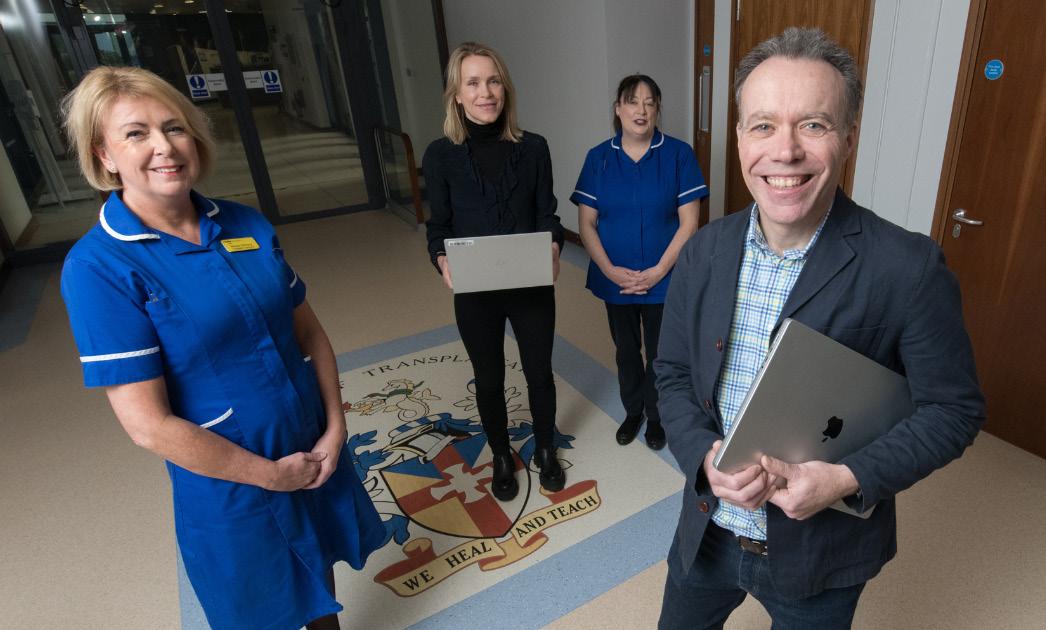
Click the QR code to visit the eLearning website.

23 #TakeOnTomorrow
PICTURED L-R: HEART TRANSPLANT CO-ORDINATOR KIRSTIE WALLACE; HOSPITALS CHARITY DIRECTOR TERI BAYLISS; HEART TRANSPLANT CO-ORDINATOR HAZEL MUSE; AND ASSOCIATE PROFESSOR JAMIE STEANE, OF NORTHUMBRIA UNIVERSITY’S SCHOOL OF DESIGN.
Support for Parkinson’s patients
The part of the brain which prompts the automatic swallowing response can be impacted by Parkinson’s Disease, meaning patients can experience a pooling of saliva which can result in drooling or even choking. In response, a team of researchers have developed the Cue Band – a wearable wristband device which delivers a vibration ‘cue’, prompting the patient to swallow without the need for medical intervention.
It was designed by a team of academics, including Dr Kyle Montague and Luís Carvalho of Northumbria University’s Department of Computer and Information Sciences, and funded by the charity Parkinson’s UK. A national trial of the device is taking place, with around 3,000 Parkinson’s patients being provided with a free Cue Band, alongside advice on how to use it.
As Dr Montague explains: “Cue Band is all about improving the quality of life for people living with Parkinson’s
Disease but without the need for further medication, which can often have unpleasant side effects.
“The device is worn on the wrist like a smart watch and connected to a smartphone app; allowing it to be preprogrammed to vibrate at scheduled times to prompt the patient to swallow.
Luís Carvalho added: “The prompting intervals and frequency of the cues can be easily adjusted, and the smartphone app allows patients to also record their symptoms so they can monitor any changes.


“The device is capable of monitoring other data, including heart rate and sleep patterns, giving us a great overall picture of a patient’s health.”
Until now the common treatment for drooling, the medical term for which is sialorrhoea, has been to provide an injection to stop saliva production, but this can have an impact on oral health, causing discomfort and a dry
mouth. The Cue Band can be produced for around £30 per device, making it a low-cost, non-medical treatment option.
The operating system running on the Cue Band is bespoke and can be updated easily. It is completely reprogrammable via the connected smartphone device, meaning there is potential for it to be used by people affected by other illnesses or diseases, who would benefit from the ‘cue’ technology.
Working alongside Dr Montague on the Cue Band project is Professor Richard Walker, of Northumbria Healthcare NHS Foundation Trust. Speaking about the trial he said: “Drooling is a major problem for people with Parkinson’s and can be very embarrassing, potentially restricting their social life. This discreet technology could make a major difference and we are keen that people with Parkinson’s themselves will help us drive the research forward.”
The Cue Band project has been funded by Parkinson’s UK. The charity’s Associate Director of Research, David Dexter, said: “Novel technologies have the potential of delivering improvements in quality of life for the 145,000 people with Parkinson’s in the UK in a shorter time frame than developing new drugs, which can take decades.
“As such Parkinson’s UK launched its non-drug approaches grant scheme three years ago. We were excited to fund the Cue Band trial being run by Dr Montague, particularly since this cheap device tackles drooling which is a major problem in Parkinson’s. We look forward to results from this clinical study.” Click
24 Northumbria University NEWS • Spring 2023
the QR code to find out more about wearing a Cue Band.
A team of researchers have received funding from Parkinson’s UK to create a potentially life-changing device which tackles one of the symptoms of Parkinson’s disease.
SENIOR RESEARCH ASSISTANT LUÍS CARVALHO WEARING A CUE BAND
DR KYLE MONTAGUE
“CUE BAND IS ALL ABOUT IMPROVING THE QUALITY OF LIFE FOR PEOPLE LIVING WITH PARKINSON’S DISEASE BUT WITHOUT THE NEED FOR FURTHER MEDICATION, WHICH CAN OFTEN HAVE UNPLEASANT SIDE EFFECTS.”
Chronic jet lag discovered in people living with HIV
World-leading research undertaken at Northumbria University has found that people living with HIV experience symptoms of jet lag due to a significant delay in their internal body clock.
The study was carried out by Professor Malcolm von Schantz of the Northumbria Centre for Sleep Research who assessed people aged 45 years and older who were both HIV positive and HIV negative living in South Africa’s Mpumalanga province. HIV is widespread in the region, with nearly one in four people living with the virus.
Working with colleagues in the University of Surrey and South Africa’s universities of Cape Town and Witwatersrand, Professor von Schantz measured levels of the hormone melatonin in people’s saliva and asked participants to wear an Actiwatch, a specialist device like a Fitbit
used in clinical trials and sleep research, to assess their daily movements. They found an average delay in the physiological daily rhythms of people who were HIV positive of more than one hour and also found that the sleep cycle of people living with HIV was shorter, noting that they fell asleep later and woke earlier.
As Mpumalanga is a large rural area, people’s lives run more closely to the natural daily light and dark cycle than those living in urban areas. The findings therefore suggest that HIV infection may cause a circadian rhythm disorder that disrupts sleep patterns in a similar way to jet lag, or as experienced by
those who work shifts. This disruption of the body clock may significantly contribute towards the increased health problems that people living with HIV can experience, despite successful treatment, such as an increased risk of cardiovascular, metabolic, and psychiatric disorders.
“The participants living with HIV essentially experience the one-hour disruption associated with switching to daylight savings time, but every single morning,” said Professor Malcolm von Schantz.
“This happens in spite of the fact that essentially everybody is exposed to the same light-dark cycle.”
As South Africa has the fourth highest rate of HIV infection in the world, the researchers believe there is a strong need for further funding to identify whether similar disruption to the body clock is experienced by younger people living with HIV and also those living in other countries.
Professor von Schantz explained: “Our findings have important potential implications for the health and wellbeing of people living with HIV, especially given the well-established relationships between disrupted circadian rhythms and sleep deprivation.”

The Northumbria Centre for Sleep Research is one of the UK’s leading laboratories working with industry partners, charities and public health bodies to understand and find new ways to treat sleep disorders. The research group was recently commissioned by Public Health
“OUR FINDINGS HAVE IMPORTANT POTENTIAL IMPLICATIONS FOR THE HEALTH AND WELLBEING OF PEOPLE LIVING WITH HIV, ESPECIALLY GIVEN THE WELLESTABLISHED RELATIONSHIPS BETWEEN DISRUPTED CIRCADIAN RHYTHMS AND SLEEP DEPRIVATION.”
PROFESSOR
MALCOLM VON SCHANTZ
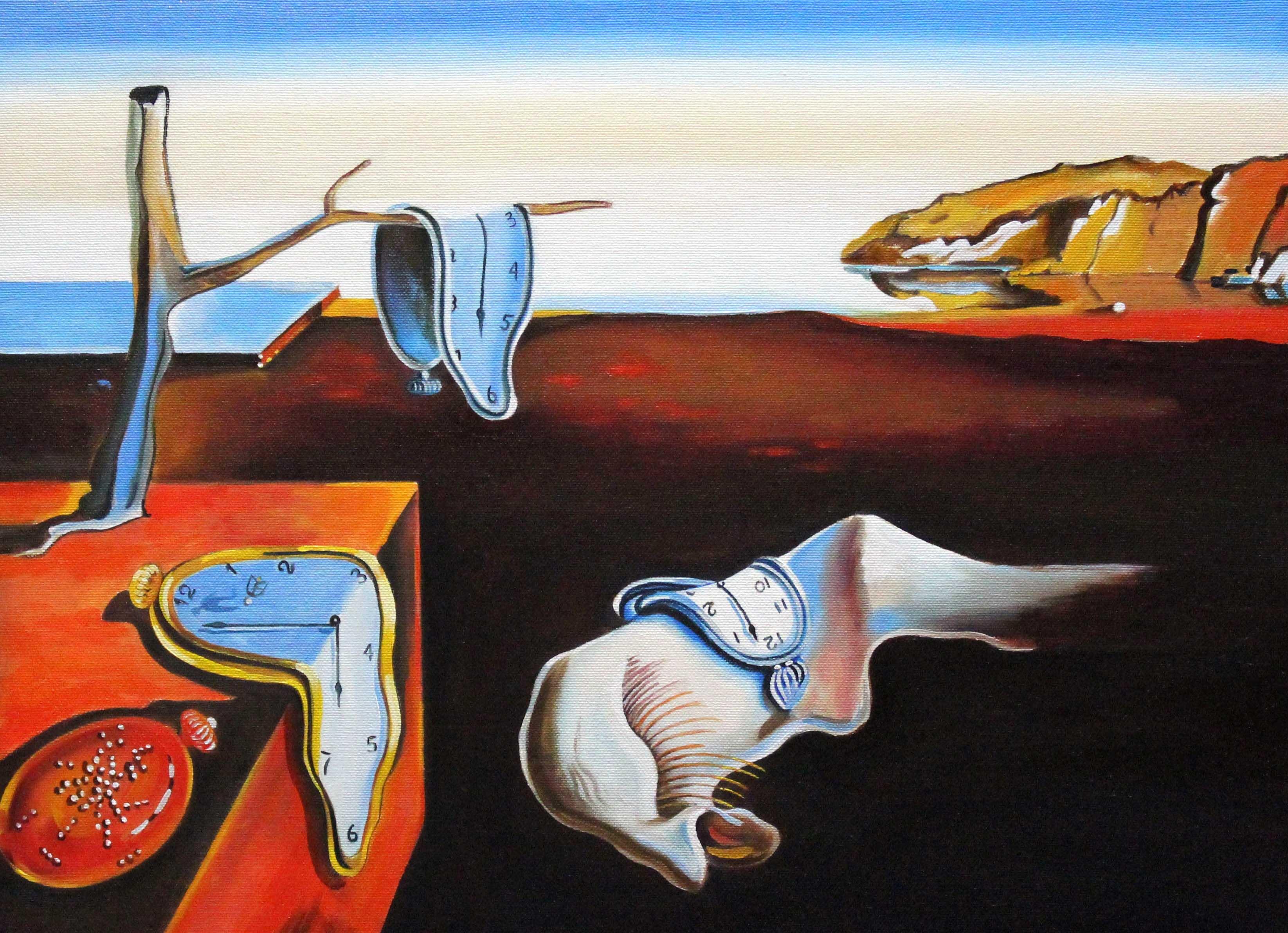
England to conduct a review on sleep and health levels in the UK and consider the economic impact of poor sleep and links between sleep and mental and physical health. The findings will be used to inform new government guidelines.
Click the QR to discover more about the Northumbria Centre for Sleep Research.

25 #TakeOnTomorrow
Left: Salvador Dali’s The Persistence of Memory.
Success for Northumbria start-ups
Students and graduates from Northumbria University have been working hard to make their entrepreneurial dreams a reality with help from the University’s Student and Graduate Enterprise team.
A group of Business students, who have used their skills to break into the world of fashion, are tackling real-world problems with their innovative start-ups. Having established businesses specialising in skiwear, personalised clothing and activewear brands, the all-woman line-up have been recognised for their entrepreneurial flair and sustainability missions at regional and national awards, as well as by a well-known fashion magazine. Find out more about each of their journeys to success by clicking the QR codes.
SETTING TRENDS ON THE SLOPES
Entrepreneurial Business Management student Renée Fraser-Shepherd recently launched Sloobie Skiwear, a revolutionary brand designed for women and the only skiwear on the market which uses Integrated Shapewear technology.

Each item of the collection has been created to be timeless, setting a clear boundary between fast fashion, and becoming a staple in women’s wardrobes which can be restyled year-on-year. And this has not gone unnoticed, as influential fashion magazine, Glamour chose to showcase the collection as part of their Complete Guide to Women’s Ski Clothes.

Renée has received support and guidance from within the University, as well as through investment pitches to The Willan Charitable Trust, who invest in student and graduate enterprises which supports the regional economy. She has also made personal connections which has led
“NORTHUMBRIA IS AHEAD OF THE CURVE, UNDERSTANDING HOW PRACTICAL LEARNING PUSHES YOU FURTHER FORWARD. I UNDERSTAND WHAT SKILLS I HAVE, MY STRENGTHS AND MY WEAKNESSES. I ALREADY FEEL AHEAD OF THE GAME, BEFORE GRADUATING”.
to coaching from Julie Blackie – the owner and managing director of Newcastle-based business, Pink Boutique.
Commenting on this, Renée said: “Having business mentors within the University as well as successful entrepreneurs like Julie Blackie has helped me to shape my business model. Julie has taught me incredible lessons and guided me towards the most efficient routes to take when launching a business.
“Northumbria is ahead of the curve, understanding how practical learning pushes you further forward. I understand what skills I have, my strengths and my weaknesses. I already feel ahead of the game, before graduating.”
After two successful pitches to The Willan Charitable Trust, Renee secured a total of £3,500 to help cover marketing costs.
Renée has also been supported through the Northumbria
Enterprise and Business Support 2 (NEBS2) scheme. Available to businesses in Tyne and Wear and Northumberland, NEBS2 provides a package of services to enhance the competitiveness and growth of SMEs, and to support the creation of new graduate enterprises.

26 Northumbria University NEWS • Spring 2023
SLOOBIE SKIWEAR
RENÉE FRASER-SHEPHERD, FOUNDER AND CEO OF SLOOBIE SKIWEAR
RENÉE FRASER-SHEPHERD, ENTREPRENEURIAL BUSINESS MANAGEMENT STUDENT
‘Most Inspirational Business Woman of the Year 2022’ is the title which now sits with Northumbria Business student, Amelia Wright following the successful launch of Mila Clothing Ltd.

Amelia was inspired by a clip on the video app Tik Tok during lockdown and took advantage of an opportunity to set up a business within the personalised embroidery space. With help from the Graduate Futures team and entrepreneurial experts at Northumbria, Mila Clothing Ltd was launched and orders began rolling in.
Amelia explained: “I came up with some basic personalised and non-personalised designs that could be embroidered on hoodies and sweatshirts, the most popular being roman numerals embroidered on hoodies displaying the date when couples got together. The idea took off in time for Valentine’s Day and I suddenly had over 25,000 views on Tik Tok. I went from 30 orders to 300 in a weekend.”

To balance University studies with her entrepreneurial ambitions, Amelia decided to use her placement year to develop her own business. She was able to access business support services from Northumbria for guidance, expert advice and mentoring from academics, and the University’s on-campus Incubator hub.
SUSTAINABLE


Graduate entrepreneurs, Sophie and Charlotte Wilson set up YANA Active in 2019, offering high-end activewear for environmentally conscious women. Their business is driven by the belief that every brand has a responsibility to support the planet and reduce consumer consumption, with the pair therefore using fabric made from 78-100% recycled materials. They also manufacture all their technical performance garments locally, at a factory in Teesside. The sisters were jointly named Sustainability Entrepreneur of the year 2022 at the prestigious Great British Entrepreneur Awards, championing the UK’s most inspiring entrepreneurial success stories.


Commenting on their win, Sophie said: “Being recognised for consciously creating an ethical and sustainable business means a great deal to us, sustainability is embedded into our brand ethos and truly is part of YANA’s DNA. We would also like to thank Northumbria for its wonderful support since we graduated.”
Sophie, a graduate in Business Leadership and Corporate Management and Charlotte a graduate in Fashion Marketing, received startup mentoring and guidance from the University through the NEBS programme.
27 #TakeOnTomorrow
TO THE CORE
Left: Sophie and Charlotte Wilson, co-founders of YANA Active
AMELIA WRIGHT, FOUNDER OF MILA CLOTHING LTD.
TIK TOK MADE ME DO IT
Putting an end to inhumane interrogation

A Northumbria University academic is working to eradicate the use of torture during police interviews by travelling around the world teaching humane, non-coercive techniques.
Under international law torture is always illegal, however, it is still regularly used during police and law enforcement interviews in some parts of the world to extract information, confessions or as a punishment.
Professor of Police Science Gavin Oxburgh is working with the global criminal justice watchdog Fair Trials to carry out training with police forces in East Africa and Central America to tackle this issue.
Over the last four years Professor Oxburgh has been part of an international steering committee, made up of experts in the fields of interviewing, law enforcement, criminal investigations, national security, military, intelligence, psychology, criminology, and human rights.
Led by former United Nations Special Rapporteur on Torture, Professor Juan Mendez, the group have been exploring the immorality and ineffectiveness of torture. Together they compiled ‘the Mendez principles’ – a set of recommendations outlining international best practice. The training carried out by Professor Oxburgh and his colleagues is based on these principles.
Professor Oxburgh recently returned from Kenya where, along with Fair Trials, he worked with the African Policing Civilian Oversight Forum and the East African Police Chiefs Cooperation Committee to deliver training to police officers in the country.
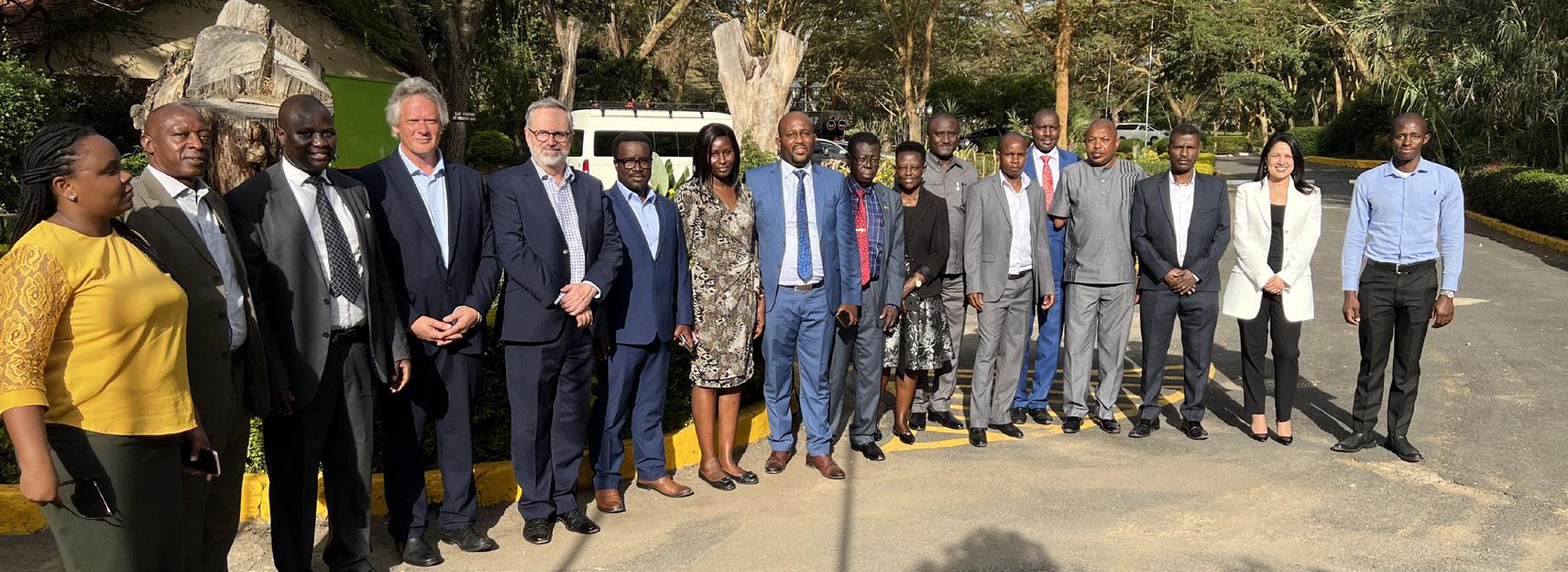
Speaking about the training, Professor Oxburgh said: “Countries around the world are now recognising that torture and coercive interview techniques are unacceptable and are
choosing to adopt The Mendez Principles.
“Part of my role is to help police chiefs and other decision makers realise that there are more effective ways to extract information from individuals during interviews.
“The training I am carrying out with Fair Trials demonstrates what a non-coercive interview could and should look like. It’s not just about best practice based on scientific research, but it is also about culture change, which will take time in many cases.
“Our aim now is to secure funding to allow for future training to take place and to continue to develop the great work we’ve started in Kenya and other countries.”
In October last year, Professor Oxburgh travelled to Dallas where he spoke about his research at the International Association of Chiefs of Police (IACP) Annual Conference and Exposition where over 15,000 police and law enforcement officers plus academic researchers were in attendance. And the following month he travelled to Mexico to work alongside public defenders to promote the use of non-coercive interviewing as a tool to help prevent ill-treatment and torture in police settings.
Clicking the QR code to find out more about the work of the steering group and to read the Principles on Effective Interviewing for Investigations and Information Gathering.

28 Northumbria University NEWS • Spring 2023
“COUNTRIES AROUND THE WORLD ARE NOW RECOGNISING THAT TORTURE AND COERCIVE INTERVIEW TECHNIQUES ARE UNACCEPTABLE AND ARE CHOOSING TO ADOPT THE MENDEZ PRINCIPLES.”
PROFESSOR GAVIN OXBURGH
PROFESSOR GAVIN OXBURGH (FIFTH FROM LEFT) PICTURED IN KENYA WITH REPRESENTATIVES FROM FAIR TRIALS, THE AFRICAN POLICING CIVILIAN OVERSIGHT FORUM AND THE EAST AFRICAN POLICE CHIEFS COOPERATION COMMITTEE.
Best in class for cyber security
Northumbria is now among a leading group of universities to be recognised by the UK Government as offering the top level of teaching, research and student experience in Cyber Security.
Recognising unsung heroes of the peace process
Awarded to Northumbria by the Government Communications Headquarters (GCHQ), the National Cyber Security Centre (NCSC) certification recognises the quality of the facilities and teaching offered to students, as well as the standard of the work students produce, the academic research informing the curriculum, and Northumbria’s links with the cyber security industry.
The NCSC certification has been awarded to Northumbria’s full and part-time MSc Cyber Security and MSc Cyber Security with Advanced Practice programmes.
The courses, which cover information governance and security, information assurance and risk management, wireless networks and security, and ethical hacking for cyber security, enable students to develop practical skills, as well as elevate their research and project management abilities.

Dr Guy Brown, Director of Northumbria’s London campus, where the Cyber Security Masters courses are delivered, said: “Northumbria University London Campus has a strong track record in both research and teaching in the areas of cyber security, cyber technology and wider information security management.
“This programme certification from the NCSC reflects our commitment to this subject area, our research and practitioner-informed curriculum, the fantastic campus resources and our wider activity in this rapidly emerging area.”
Chris Ensor, NCSC Deputy Director for Cyber Growth, said: “I am delighted that Northumbria University has had its Cyber Security Masters degrees fully certified by the NCSC. It demonstrates our shared commitment to responsibly developing the cyber security talent pipeline.
“Offering a NCSC-certified degree helps prospective students make better informed choices about the quality of courses available and employers can rest assured that graduates will be well-taught and have valued industry skills.”
To find out more studying Cyber Security, click the QR code.
New research from Northumbria University is shining a light on the vital role that non-governmental civil society organisations played in the Northern Ireland peace process.

While much of the work in the lead up to the 1998 Good Friday agreement has been attributed to politicians, academics Dr Connal Parr from Northumbria and Dr Stephen Hopkins from the University of Leicester, believe grassroots groups were also key to bringing about an end to The Troubles. The pair have been awarded funding through the Irish Government’s Reconciliation Fund to investigate the impact of civil society groups and individuals who played an active role in the peace process in Northern Ireland in the late 1980s and 90s. Over the coming months the stories of these individuals will be told through a witness seminar and conference.
Dr Connal Parr, Assistant Professor in History at Northumbria, said: “The conventional view has always been that it was Prime Ministers and other politicians who brought about peace –but we know there was a lot of work going on at a grassroots level which has been mostly overlooked up until now. The aim of this project is to shine a light on those people and groups and
record their stories and experiences.”
The research project, Paving the Path to Peace: Civil Society and the Northern Ireland Peace Process, 1989-1998, will involve hearing from members of the campaign group the Peace Train Organisation. Set up in 1989 in protest at the repeated bombing of the Dublin to Belfast railway line by the Provisional IRA, the group hired a train, carrying hundreds of people from all over Ireland, to travel across the border in a symbolic gesture.

As part of the research, members of the campaign group will discuss their work in bridging social and cultural movements during a witness seminar. This will be followed by a conference in June, during which members of a wide variety of civil society groups, including the Shankill Women’s Centre, the West Belfast Festival/Féile an Phobail, the John and Pat Hume Foundation, the Irish Congress of Trade Unions, Healing Through Remembering, the Maydown Ebrington Group, and the WAVE Trauma Centre, will share their experiences.
The evidence gathered at the witness seminar will be recorded in a pamphlet, while the talks from the conference will be published in a book, creating a lasting record for the future.
Speaking about the timing of the project, Dr Parr said: “In the context of strained British-Irish official relationships since 2016, this project will underline the importance of open dialogue and peace-making, with a focus upon the significance of creative inputs from civil society across these islands.”
A published author, Dr Parr’s first book Inventing the Myth: Political Passions and the Ulster Protestant Imagination (2017) was shortlisted for the EwartBiggs Literary Prize and the Royal Historical Society’s Whitfield Prize for distinguished first books. He is a board member of Etcetera Theatre Company and is currently completing a book on the Irish Anti-Apartheid Movement.
Dr Stephen Hopkins is Lecturer in Politics in the School of History, Politics and International Relations at the University of Leicester, UK. He has also written and co-authored books on the Northern Ireland Troubles.
To find out more about research at Northumbria, click the QR code.


29 #TakeOnTomorrow
DR CONNAL PARR
“THE CONVENTIONAL VIEW HAS ALWAYS BEEN THAT IT WAS PRIME MINISTERS AND OTHER POLITICIANS WHO BROUGHT ABOUT PEACE – BUT WE KNOW THERE WAS A LOT OF WORK GOING ON AT A GRASS ROOTS LEVEL WHICH HAS BEEN MOSTLY OVERLOOKED.”
Failings found at major football final
The report is based on the written testimonies of 485 women, men, and children, and from eyewitness accounts by international journalists who attended the high-profile football game in May 2022 between Real Madrid and Liverpool.
Compiled by five leading authorities in their respective fields, including Dr Patricia Canning, Assistant Professor in the Department of Humanities at Northumbria, the report, “Treated with Contempt”: An Independent Panel Report into Fans’ Experiences Before, During and After the 2022 Champions League Final in Paris’, uses fans’ written evidence submitted in
the days after the event. An applied linguist specialising in forensic texts and contexts, Dr Canning’s work includes the investigation and analysis of police reporting, and her role in this report was to analyse the hundreds of witness accounts from those who attended the football game in Paris.
“Collectively and consistently, fans’ testimonies demonstrate the shocking treatment they suffered before and after the match, particularly at the hands of those who should have ensured their safety,” she said. As part of a separate project, Dr Canning has also analysed witness statements following the Hillsborough disaster; a fatal
human crush during a football match at Hillsborough Stadium in Sheffield on 15 April 1989, where 97 Liverpool supporters tragically died.
According to journalists who attended the Champions League Final in May 2022, fans were held for several hours in a bottleneck close to the ground, then again in queues at malfunctioning turnstiles. Many who had paid significant amounts of money for match tickets, travel and accommodation did not even enter the stadium to watch the football game. The report outlines statements from fans saying they were subjected to unprovoked teargassing by French police and on leaving

the stadium were attacked at knifepoint by gangs who stole their possessions after the match. Thousands of fans, including children, have been left traumatised, according to authors of the report. “Already evident is the longer-term impact on fans’ physical health and psychological well-being,” continued Dr Canning. “The consequences of events on and after 28th May 2022 will have personal and professional ramifications for a long time to come.”
Alongside Dr Canning, authors of the report include Professor Phil Scraton from Queen’s University Belfast, who is internationally recognised
for his investigative work into the circumstances of the Hillsborough disaster. Other contributors to the report include Dr Deena Haydon, an independent researcher and writer, Dr Lucy Easthope, Professor in Practice of Risk and Hazard at Durham University, and journalist and broadcaster Peter Marshall.
Click the QR code to find out more about Humanities research at Northumbria.

30 Northumbria University NEWS • Spring 2023 SPORT
A Northumbria University academic has contributed to a report that explores the violence experienced by fans before, during, and after last year’s European Champions League Final in Paris.
Below: A view from the behind the goal at Paris’ Stade de France
“THE CONSEQUENCES OF EVENTS ON AND AFTER 28TH MAY 2022 WILL HAVE PERSONAL AND PROFESSIONAL RAMIFICATIONS FOR A LONG TIME TO COME.”
A VIEW FROM BEHIND THE GOAL AT PARIS’ STADE DE FRANCE
DR PATRICIA CANNING
Northumbria launches degree in association with FC Barcelona
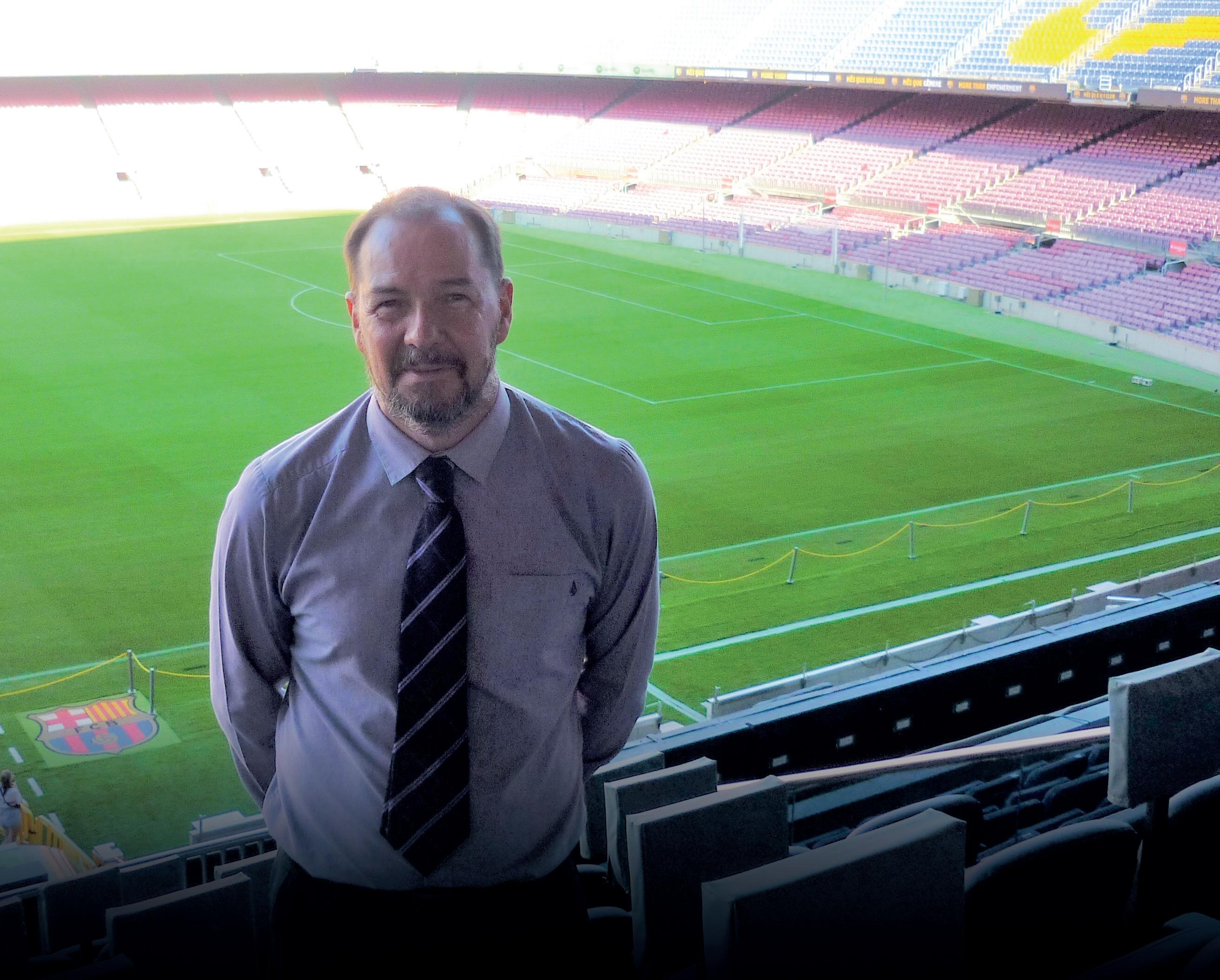
Northumbria
University has signed a new partnership with Barcelona’s Higher Institute of Law and Economics – known in Spain as the Instituto Superior de Derecho y Economía (ISDE) - to run a BSc (Hons) Sport Management degree, leading to a Global Masters in Sports Management and Legal Skills with FC Barcelona.
The partnership, which opens the door to FC Barcelona, has seen the development of a course which responds directly to the distinctive needs of international sports organisations. The programme of study has been designed from the outset as a sport management degree, rather than a business degree with a few sport modules attached.
Dr Paul Cook, Northumbria University/ISDE BSc Partnership Manager, explained that the BSc (Hons) Sport Management degree is designed to align theory with practice. “We want our graduates to be critical thinkers with can-do competencies,” he said. “This combination of teaching and qualifications provides our students with the type of employability advantage Northumbria and ISDE pride themselves on.”
Students are taught in a purpose-built classroom at the newly renovated ISDE campus on the exclusive Avenida del Tibidabo, in Barcelona. Classes are in English and are delivered by experienced lecturers with extensive sports industry experience. Having recently welcomed the first cohort of students at an induction event at the world-famous Camp Nou - home of FC Barcelona – Albert Mundet, Director of Strategy and Innovation at FC Barcelona, highlighted the uniqueness of the partnership: “This is the only undergraduate programme
FC Barcelona is associated with and we are proud to work with Northumbria University.”
Juan de Dios Crespo, ISDE Academic Director for the BSc, described this combination of qualifications in partnership with a global sports club as a “world first”. “The students have a unique learning opportunity, their interactions with teachers and sport industry practitioners will be supported by one of the world’s most recognised sport’s clubs,” he added.
As part of the ISDE partnership, Northumbria’s Department of Sport, Exercise and Rehabilitation also has an opportunity to share its world-leading research with the Barça Innovation Hub - a sport innovation and knowledge
centre created by FC Barcelona. The Hub’s mission is to create an ecosystem that bolsters knowledge and innovation, promotes a culture of excellence through collaboration with prestigious brands, universities, research centres, start-ups, entrepreneurs, students, athletes, investors, and
visionaries from all over the world. Montserrat Pintó Sala, Executive Director of ISDE Barcelona, explained: “Through this BSc, Northumbria University joins ISDE on our 27-year journey of growth and constant development, consolidating our shared institutional and educational values that help us to take on tomorrow.”
Dr Cook, who has extensive experience in developing learning partnerships, managing multidisciplinary research groups, and enabling multi-agency knowledge exchange, added: “Meeting the FC Barcelona Board of Directors and receiving their congratulations and best wishes gives me confidence that the partnership will deliver benefits for a wide range of partners.” Click the QR code to find out more about the Northumbria BSc (Hons) Sport Management programme at ISDE Barcelona.

31 #TakeOnTomorrow
SPORT
DR PAUL COOK, NORTHUMBRIA UNIVERSITY/ISDE BSC PARTNERSHIP MANAGER AT CAMP NOU
World Cup debut for sporting star
Rugby has always been a passion of Zoe’s. She first played at a small club in Whitley Bay, progressing to a semi-professional level playing for Leeds Rhinos, and has since represented England against Canada in the sport.


Commenting on how proud she was to be part of such an impressive line-up, she said: “I was honoured to make my debut in a home World Cup, it’s something I’ve dreamed of being a part of, but was even more special to have all my friends and family there with me.
“I’ve wanted to play Rugby League for England since being young. It made me proud of the hard work I’ve put in and made the blood, sweat and tears worth it. I also wanted to do the North East proud and show everyone that anything is possible after starting out at a small club in Whitley Bay.”
Zoe joined Northumbria as a TASS (Talented Athlete Scholarship Scheme) athlete, after being nominated by the Rugby Football League.
Northumbria student represents Great Britain in Goalball World Championships
Occupational Therapy student, Lois Turner,
This means alongside assistance from Northumbria’s expert practitioners in physiotherapy, strength and conditioning and personal development, Zoe also has dual career support. Highly talented sporting individuals are offered flexibility throughout their studies, relieving pressure on the athletes. Zoe is therefore able to complete her degree whilst fulfilling her sporting commitments.
“The University has fully supported me during my studies as well as in my Rugby League Career and helped me massively in preparation for the World Cup last year,” Zoe said. “I’m also a member of Northumbria Women’s Rugby Union team which is a really welcoming and inclusive group of people. I felt at home as soon as I joined and have ever since.”
To find out more about Sport at Northumbria, click the QR code.


Lois, 25, took on the challenge of representing her country at Goalball, a team sport designed specifically for athletes with a visual impairment, whilst studying for her master’s degree at Northumbria University.
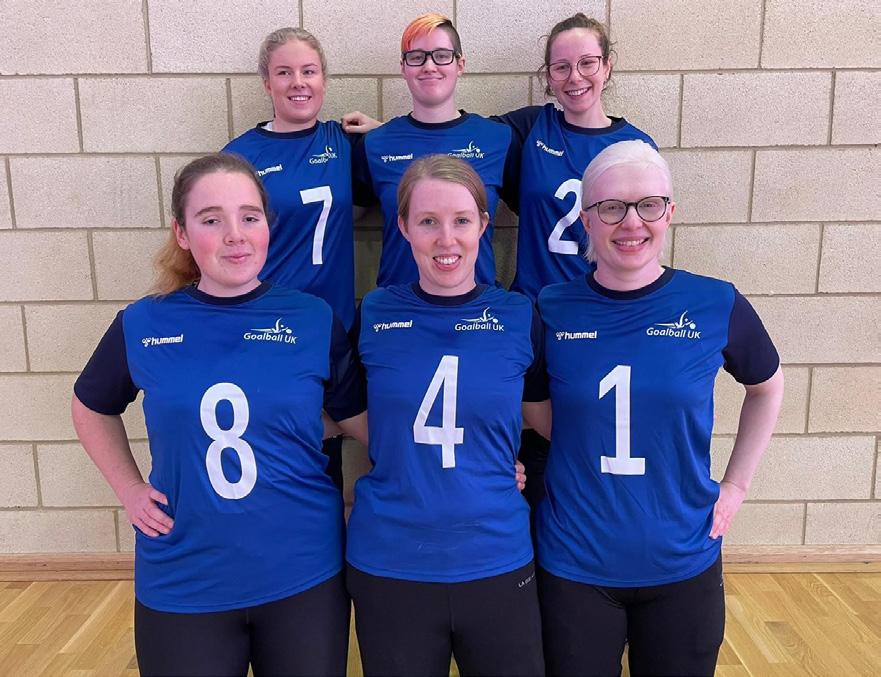
The December World Championships saw Lois and the team face tough competition from across the globe. The squad managed to reach the quarter finals after a fantastic performance in the preliminary rounds, where they ultimately faced a close defeat from Canada’s team.
Lois praised Northumbria University for encouraging her dual career: “Both my placement and the lecturers at the University have been amazing at supporting me where possible, by adapting my placement hours or making up for missed time for international competition and training. This is a big part of managing my dual career as both my studies and being an athlete takes up a lot of my time. The University’s Scholarship Scheme has allowed me to train around my studies”, added Lois.
Lois, a TASS (Talented Athlete Scholarship Scheme) athlete, also credited her friends and family for their continuous support whilst getting ready for the competition: “During the preparation for the World Championships, I started my master’s degree as well as a full-time placement in a major hospital. It has been really challenging managing training and my studies, but my friends/ family have been my rock supporting me with anything they can”.
Click the QR code to find out more about the University’s Sport Scholarship Scheme.
Issue 28 Spring 2023 • northumbria.ac.uk
was selected to compete for Great Britain at the International Blind Sports Federation (IBSA) Goalball World Championships.
Leeds Rhinos forward and Northumbria Sport Development student, Zoe Hornby, recently made her England debut at the Women’s Rugby League World Cup.
OCCUPATIONAL THERAPY STUDENT, LOIS TURNER, (BOTTOM LEFT) SELECTED TO COMPETE AT THE IBSA GOALBALL WORLD CHAMPIONSHIPS.










































































































































